2020-2021学年江苏省南京市第一中学(上学期)高一周测(含答案)
江苏省2020-2021学年上学期高一英语期中解析版试卷精选汇编:语法填空专题(含解析)
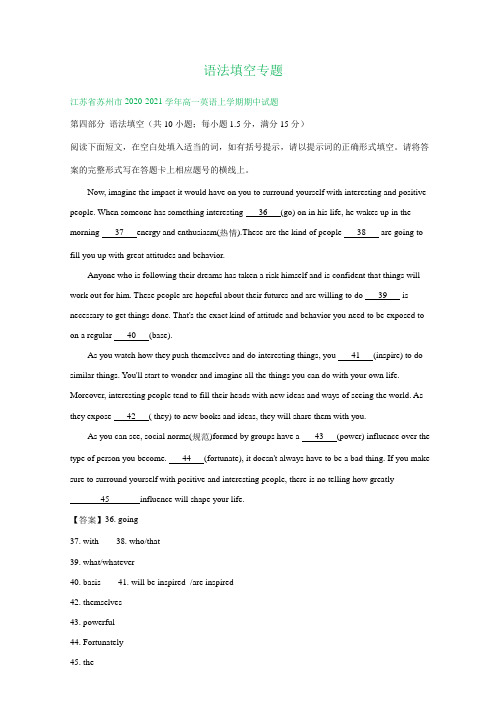
语法填空专题江苏省苏州市2020-2021学年高一英语上学期期中试题第四部分语法填空(共10小题;每小题1.5分,满分15分)阅读下面短文,在空白处填入适当的词,如有括号提示,请以提示词的正确形式填空。
请将答案的完整形式写在答题卡上相应题号的横线上。
Now, imagine the impact it would have on you to surround yourself with interesting and positive people. When someone has something interesting ___36___(go) on in his life, he wakes up in the morning ___37___energy and enthusiasm(热情).These are the kind of people ___38___ are going to fill you up with great attitudes and behavior.Anyone who is following their dreams has taken a risk himself and is confident that things will work out for him. These people are hopeful about their futures and are willing to do ___39___ is necessary to get things done. That's the exact kind of attitude and behavior you need to be exposed to on a regular ___40___(base).As you watch how they push themselves and do interesting things, you ___41___(inspire) to do similar things. You'll start to wonder and imagine all the things you can do with your own life. Moreover, interesting people tend to fill their heads with new ideas and ways of seeing the world. As they expose ___42___( they) to new books and ideas, they will share them with you.As you can see, social norms(规范)formed by groups have a ___43___(power) influence over the type of person you become. ___44___(fortunate), it doesn't always have to be a bad thing. If you make sure to surround yourself with positive and interesting people, there is no telling how greatly_______45_______influence will shape your life.【答案】36. going37. with 38. who/that39. what/whatever40. basis 41. will be inspired /are inspired42. themselves43. powerful44. Fortunately【解析】这是一篇夹叙夹议的文章。
2020-2021学年度第一学期高一英语试卷(含答案)
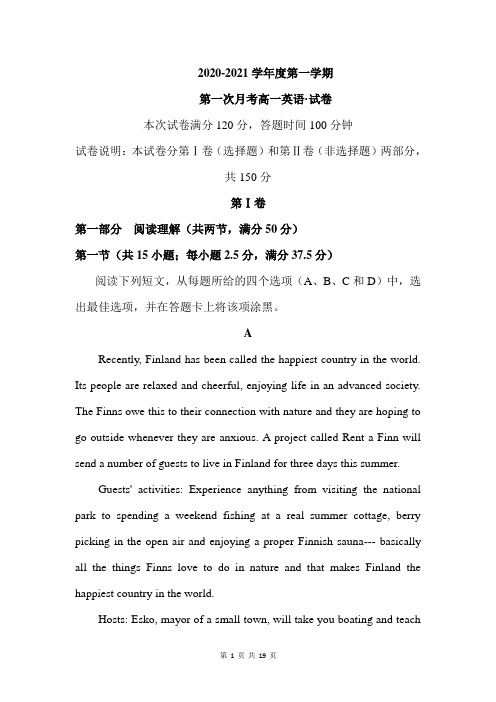
2020-2021学年度第一学期第一次月考高一英语·试卷本次试卷满分120分,答题时间100分钟试卷说明:本试卷分第Ⅰ卷(选择题)和第Ⅱ卷(非选择题)两部分,共150分第Ⅰ卷第一部分阅读理解(共两节,满分50分)第一节(共15小题;每小题2.5分,满分37.5分)阅读下列短文,从每题所给的四个选项(A、B、C和D)中,选出最佳选项,并在答题卡上将该项涂黑。
ARecently, Finland has been called the happiest country in the world. Its people are relaxed and cheerful, enjoying life in an advanced society. The Finns owe this to their connection with nature and they are hoping to go outside whenever they are anxious. A project called Rent a Finn will send a number of guests to live in Finland for three days this summer.Guests' activities: Experience anything from visiting the national park to spending a weekend fishing at a real summer cottage, berry picking in the open air and enjoying a proper Finnish sauna--- basically all the things Finns love to do in nature and that makes Finland the happiest country in the world.Hosts: Esko, mayor of a small town, will take you boating and teachyou to play molkky, a Finnish throwing game. If you stay with Hanna, an IT professional, you will travel to her grandmother's lakeside home outside Helsinki, where you will pick blueberries and it's traditional food. Linda and Niko live on Uto, an island with a population of around 40. They'll take you sailing, show you the lighthouse, and camp out with you on the island.Application: Now is the time to apply by filling out an online application form and filming a 3-minute video describing yourself, your connection to nature, and why you want to visit Finland. Submit(提交), breathe deeply and wait with your fingers crossed.1. What do Finns think is the main reason for their happiness?A. Living in a rich country.B. Getting close to nature.C. Getting on well with others.D. Keeping in the high spirits.2. What can guests do in the project to Rent a Finn?A. Pick berries in the wild.B. Fish a whole week.C. Visit several local museums.D. Play molkky on an island.3. Who will show guests around and camp with them on an island?A. EskoB. HannaC. Hanna's grandmotherD. Linda and NikoBWhen I was 16 years old, I made my first visit to the United States. It wasn't the first time that I had been abroad. Like most British children, I learned French at school and I had often been to France, so I was used to speaking a foreign language to people who didn't understand English. But when I went to America, I was really looking forward to having a nice easy holiday without any language problems.How wrong I was! The misunderstanding began at the airport. I was looking for a public telephone to give my friend Mary a ring and tell her that I had arrived. A friendly old man saw me looking like being lost and asked if he could help me." Yes," I said." I want to give my friend a ring."" Well, that's nice," he said." Are you getting married? But aren't you a bit young?"" Who is talking about marriage?" I replied." I just want to give my friend a ring to tell her I've arrived. Can you tell me where there's a phone box?"" Oh!" he said." There is a phone downstairs."When at last we did meet up, Mary explained the misunderstanding to me." Don't worry," she said to me." I had many difficulties at first. There are lots of words which the Americans use differently in meaning from usBritish. You'll soon get used to all the funny things they say. But most of the time British and American people can understand each other!"4. Where was white from?A. He was from America.B. He was from France.C. He was from Britain.D. He was from China.5. The writer thought in America.A. he wouldn't have any language difficulties.B. he would not understand Americans.C. the Americans might not understand him.D. he would have difficulties at the airport.6. The writer wantedA. to buy a ring for his friendB. to make a call to his friendC. to go to the telephone companyD. his found to see him off7. From the passage we can see that" give somebody a ring"A. means the same in America as in BritainB. means "call somebody" to the old manC. means "be going to get married"D. has different meanings in America and in BritainCMany of us don't pay much attention to the importance of eye care. It is said that if you take care of your body then you can surely be healthy. That is why our eyes should be given a lot of care. Natural eye care should be put in a number one place.There are several causes leading to poor eyesight like having not enough food, genes and aging(老化). Televisions, computers and reading are also the causes of having poor eyesight. If you happen to work in front of the computer, it is best to take a break every once in a while. Something dirty can cause redness and it will make you feel uncomfortable. It is bad for your eyes, too. If this happens, the best way is to clean your eyes by using cold water. You must also try your best to protect your eyes from harmful things. For example, sunglasses are not just for fashion but they can also serve as a great way to protect your eyesight from UV rays.Eating healthy food will do good to your eyesight. Remember that vitamins A, C and E are good for eyes. Try to eat food groups that have these vitamins. And you should do eye exercises which can protect your eyesight, too. If a person exercises regularly and eats the right kind of food, his eyes will stay in good condition for a long time.All above are natural ways of eye care that help us to keep healthy eyes. Being happy all the time can be helpful to a person's eyesight, too. In a word, eye care is very important, no matter how old a person is.8. is the most important way to protect our eyes.A. Nature eye careB. Taking medicineC. Seeing the doctorD. Being happy all the time9. All the following courses can lead to bad eyesight exceptA.agingB. heightC.readingD. computers10. What should you do if you have to work in front of the computer?A. Eat healthy food.B. Clean the eyes by using cold water.C. While a pile of sunglasses.D. Have a rest after working for a while.11. Which is the best title of the passage?A. Ways of Eye CareB. Ways of Eye ExercisesC. Ways of Being HappyD. Ways of Being HealthyDIf you want to become a fluent English speaker you should take some advice. There are four skills in learning English. They are reading, listening, speaking and writing. The most important thing you must remember is that if you want to improve your speaking and writing skills you should first master the skills of reading and listening.Read as much as you can. But your reading must be active. It means that you must think about the meaning of sentences, the meaning of unfamiliar words etc. There is no need for you to pay much attention to grammar or try to understand all the unfamiliar words you come across, but the fact that you see them for the first time and recognize them whenever you see them, for example, in other passages or books, is enough. It would be better to prepare a notebook for yourself so you can write down the important words or sentences in it.As for listening, there are two choices: besides reading, you can listen every day for about 30 minutes. You can only pay attention to your reading and become skilful at your reading, and then you can catch up on your listening. Since you have lots of inputs in your mind, you can easily guess what the speaker is going to say. This never means that you should not practice listening.For listening you can listen to cartoons or some movies that are specially made for children. Their languages are easy. Or, if you are goodat listening you can listen to VOA or BBC programs every day. Again the thing to remember is being active in listening and preferably taking some notes.If you follow this pieces of advice you are speaking and writing will improve automatically, and you can be sure that with a little effort, they will become perfect.12. According to the author, which should you improve first amount the four skills.A. Reading and listening.B. Reading and writing.C. Writing and speaking.D. Speaking and listening.13. To improve your reading, when you read you should .A. look up all new words in the dictionary.B. spend more time studying grammar.C.think about what you are reading actively.D. copy as many words and sentences as possible.14. The author seems to agree with the view that .A. everyone should listen to VOA or BBC programs every day.B. you needn't practice listening if you keep on reading every day.C. being good at reading is helpful in improving your listening.D. you should take notes of whatever you are hearing.15. The passage is mainly about how toA. choose suitable listening materials.B. deal with new words in reading.C. improve your English as quickly as possible.D. become good at English reading and listening.第二节(共5小题;每小题2分,满分10分)根据短文内容,从短文后的选项中选出能填入空白处的最佳选项。
2020-2021学年高一物理上学期期中试题(含解析)
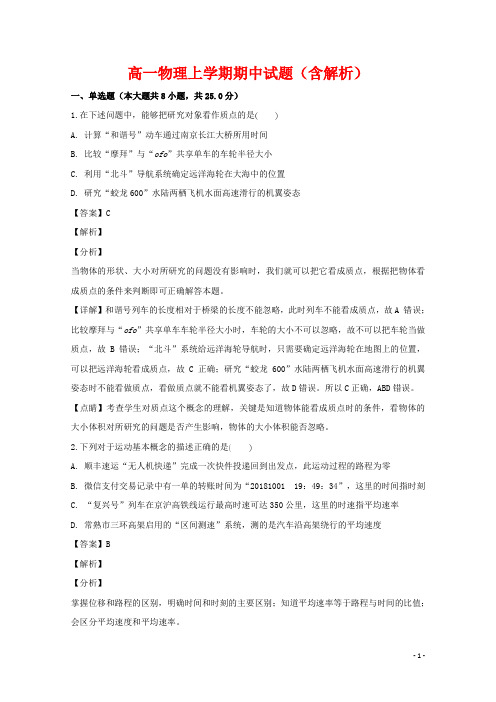
高一物理上学期期中试题(含解析)一、单选题(本大题共8小题,共25.0分)1.在下述问题中,能够把研究对象看作质点的是A. 计算“和谐号”动车通过南京长江大桥所用时间B. 比较“摩拜”与“ofo”共享单车的车轮半径大小C. 利用“北斗”导航系统确定远洋海轮在大海中的位置D. 研究“蛟龙600”水陆两栖飞机水面高速滑行的机翼姿态【答案】C【解析】【分析】当物体的形状、大小对所研究的问题没有影响时,我们就可以把它看成质点,根据把物体看成质点的条件来判断即可正确解答本题。
【详解】和谐号列车的长度相对于桥梁的长度不能忽略,此时列车不能看成质点,故A 错误;比较摩拜与“ofo”共享单车车轮半径大小时,车轮的大小不可以忽略,故不可以把车轮当做质点,故B错误;“北斗”系统给远洋海轮导航时,只需要确定远洋海轮在地图上的位置,可以把远洋海轮看成质点,故C 正确;研究“蛟龙600”水陆两栖飞机水面高速滑行的机翼姿态时不能看做质点,看做质点就不能看机翼姿态了,故D错误。
所以C正确,ABD错误。
【点睛】考查学生对质点这个概念的理解,关键是知道物体能看成质点时的条件,看物体的大小体积对所研究的问题是否产生影响,物体的大小体积能否忽略。
2.下列对于运动基本概念的描述正确的是A. 顺丰速运“无人机快递”完成一次快件投递回到出发点,此运动过程的路程为零B. 微信支付交易记录中有一单的转账时间为“2018100119:49:34”,这里的时间指时刻C. “复兴号”列车在京沪高铁线运行最高时速可达350公里,这里的时速指平均速率D. 常熟市三环高架启用的“区间测速”系统,测的是汽车沿高架绕行的平均速度【答案】B【解析】【分析】掌握位移和路程的区别,明确时间和时刻的主要区别;知道平均速率等于路程与时间的比值;会区分平均速度和平均速率。
【详解】路程是轨迹的长度,顺丰速运“无人机快递”完成一次快件投递回到出发点,此运动过程的路程不为零,故A错误;查看微信支付交易记录时发现有一单的转账时间为:49:34,这对应一个瞬间,故这里的时间是时刻,故B正确;“复兴号”列车组列车在京沪高铁线按时速350公里运行,这里的时速指瞬时速率,故C错误;“区间测速”测量的是某一过程的速度,是路程与时间的比值,为平均速率,故D错误。
2020-2021学年度高一上学期期中考试化学试卷及答案(含五套题)

2020-2021学年度⾼⼀上学期期中考试化学试卷及答案(含五套题)10 / 102020-2021学年度⾼⼀上学期期末考试化学试题题号⼀⼆三总分得分(满分:100分时间:100分钟)可能需要的相对原⼦质量数据H: 1 , C :12, O :16,Na :23,S :32,Cl :35.5,Al :27,Cu: 64, Ba:137 Fe :56 Mg :24 Cr:52 K:39 N:14 Si:28⼀、选择题:本⼤题共16⼩题,每⼩题3分,在每⼩题给出的四个选项中,只有⼀项是符合题⽬要求的。
1.对于易燃、易爆、有毒的化学物质,往往会在其包装上⾯贴上危险警告标签。
下列物质贴错了包装标签的是( ) A. 浓硫酸B. 汽油C. 酒精D. 氯化钾2.完成下列实验所选择的装置或仪器(夹持装置已略去)正确的是A. AB. BC. CD. D3.我国古代四⼤发明之⼀的⿊⽕药是由硫磺粉、硝酸钾和⽊炭粉按⼀定⽐例混合⽽成的,爆炸的反应为:S+2KNO 3+3C K 2S+N 2↑+3CO 2↑,下列说法中正确的是() A. 该反应中的还原剂为KNO 3B. 该反应中C 被还原C. 若消耗32g S ,该反应转移电⼦数为2 N AD. 若⽣成标准状况下⽓体22.4L ,则有0.75 mol 物质被还原 4.阿伏加德罗常数的值为N A ,下列说法中正确的是() A. 5NH 4NO 32HNO 3+4N 2↑+9H 2O 反应中,⽣成28 g N 2,转移的电⼦数⽬为3.75N AB. 常温常压下,ag 某⽓体含分⼦数为b ,则cg 该⽓体的体积为22.4bc aN ALC. 2mol/L 的CaCl 2溶液中Cl -的数⽬为4N AD. 46g NO 2和N 2O 4的混合⽓体中含有的氧原⼦个数为3N A 5.下列说法正确的是( )A. 摩尔是⼀种国际基本物理量B. 氧⽓的摩尔质量为32gC. H 2的⽓体摩尔体积约为22.4LD. 1mol H 2O 约含有6.02×1023个⽔分⼦6.氧化还原反应与四种基本反应类型的关系如下所⽰,则下列化学反应属于阴影部分的是( )此卷只装订不密封班级姓名准考证号考场号座位号10 / 10A. Cl 2+2KBrBr 2+2KClB. 2NaHCO 3Na 2CO 3+H 2O+CO 2↑C. 4NO 2+O 2+2H 2O=4HNO 3D. 2Na 2O 2+2CO 2=2Na 2CO 3+O 2 7.下列说法正确的个数有①盐卤点⾖腐、江河⼊海⼝处“三⾓洲”的形成、⾼压直流电除烟尘均与胶体的性质有关②通电时,溶液中的溶质粒⼦分别向两极移动,胶体中的分散质粒⼦向某⼀极移动③氢氧化铁胶体能稳定存在的主要原因是胶体粒⼦做布朗运动④做氢氧化铁胶体电泳实验时,阴极周围红褐⾊加深,说明氢氧化铁胶体带正电⑤向FeCl 3溶液中滴加NaOH 溶液,可制得Fe(OH)3胶体⑥1mol FeCl 3完全与⽔反应⽣成氢氧化铁胶体粒⼦数约为N A 个⑦淀粉溶液和蛋⽩质溶液是溶液,不可能是胶体 A. 1个 B. 2个 C. 3个 D. 4个8.下列各组离⼦中,能在溶液中⼤量共存的是() A. Na +、Cu 2+、Cl ﹣、OH ﹣ B. H +、Ca 2+、HCO 3﹣、NO 3﹣ C. Fe 2+、H +、SO 42﹣、NO 3﹣ D. Na +、CO 32﹣、OH ﹣、K + 9.下列离⼦⽅程式正确的是( ) A. 往NaHSO 4溶液中加Ba(OH)2溶液⾄恰好中和:Ba 2++2OH -+2H ++SO 42-=BaSO 4↓+2H 2O B. 碳酸钙与盐酸反应:2H ++CO 32-=CO 2↑+H 2OC. 铁与稀盐酸反应:2Fe+6H +=2Fe 3++3H 2↑D. 往Ba(OH)2溶液中加少量硫酸溶液:Ba 2++OH -+H ++SO 42-=BaSO 4↓+H 2O10.下列溶液中,溶质的物质的量浓度不是1 mol ·L -1的是() A. 10g NaOH 固体溶解在⽔中配成250mL 溶液 B. 将80g SO 3溶于⽔并配成1L 的溶液C. 将0.5mol ·L -1的NaNO 3溶液100mL 加热蒸发掉50g ⽔的溶液D. 标况下,将22.4L 氯化氢⽓体溶于⽔配成1L 溶液11.今有⼀种固体化合物X ,X 本⾝不导电,但熔化状态或溶于⽔中能够电离,下列关于该化合物X 的说法中正确的是 A. X ⼀定是电解质 B. X 可能为⾮电解质 C. X 只能是盐类 D. X 可以是任意化合物12.将SO 2通⼊⾜量Fe 2(SO 4)3溶液中,完全反应后再加⼊K 2CrO 4溶液,发⽣的两个化学反应为SO 2+2Fe 3++2H 2O=SO 42-+2Fe 2++W ①, Cr 2O 72-+a Fe 2++b H +Cr 3++Fe 3++H 2O ②,下列有关说法正确的是A. 还原性:Cr 3+>SO 2B. 配平后⽅程式②中,a=6,b=7C. Cr 2O 72-能将Na 2SO 3氧化成Na 2SO 4D. ⽅程式①中W 为OH - 13.200 mL 0.3 mol/L 的K 2SO 4溶液和100 mL 0.2 mol/L 的Fe 2(SO 4)3溶液混合后(不考虑混合后溶液体积的变化),溶液中SO 42-的物质的量浓度为A. 0.3 mol/LB. 0.4 mol/LC. 0.45 mol/LD. 0.5 mol/L 14.下列离⼦⽅程式的书写中,正确的是A. H 2SO 4与Ba (OH )2溶液反应: Ba 2++ OH - + H +⼗SO 42-= BaSO 4↓ + H 2O10 / 10B. 碳酸钙中加⼊盐酸 : CO 32- + 2H + = CO 2↑ + H 2OC. 将氢氧化铁放⼊盐酸中: Fe (OH )3 + 3H + = Fe 3+ + 3H 2OD. 氧化铜与稀硫酸反应: 2H + + O 2—= H 2O15.物质的量浓度为0.05 mol ·L -1的⾦属氯化物(RCl x ) 溶液20 mL ,恰好与20 mL 0.15 mol ·L -1的AgNO 3溶液完全反应。
2020-2021学年江苏省南京市金陵中学高一上学期12月月考数学试题(解析版)

D.f(x)的最小值为 2
【答案】BC
【分析】通过
f
6
f
6
可判断 A;通过
f
x
f
x 可判断 B;通过
5
f
2
x
f
2
x
可判断
C;通过当
x
0 时,
f
x
0
可判断
D.
【详解】对于命题
A,
f
6
1 2
2
5 2
,
f
6
1 2
2
5 2
,则
f
6
f
6
,
所以,函数 f x 的图象不关于 y 轴对称,命题 A 错误;
【分析】先由幂函数的定义求出 m 0 或 m 3 ,再检验得解. 【详解】依题意得 m2 3m 1 1 ,解得 m 0 或 m 3 .
当 m 0 时, f x x ,其图像经过原点,不符合题意; 当 m 3 时, f x x2 ,其图像不经过原点,符合题意,
因此实数 m 的值为 3. 故答案为 3 【点睛】本题主要考查幂函数的图象和性质,意在考查学生对这些知识的理解掌握水平.
14. 2 lg 5 2 lg 8 lg 5 lg 20 lg2 2 =___________ 3
【答案】3 【分析】由题意结合对数的运算法则整理计算即可求得最终结果. 【详解】由题意结合对数的运算法则有:
2 lg 5 2 lg 8 lg 5 lg 20 lg2 2 3
2 lg 5 2 lg 2 lg 5 2 lg 2 lg 5 lg 22
1 标变为原来的
倍(纵坐标不变),得到函数 g(x) 的图象,则函数 g( x) 3sin(2x ) ,
江苏省南京市2020-2021学年度高一第一学期阶段监测英语试卷(含答案解析)
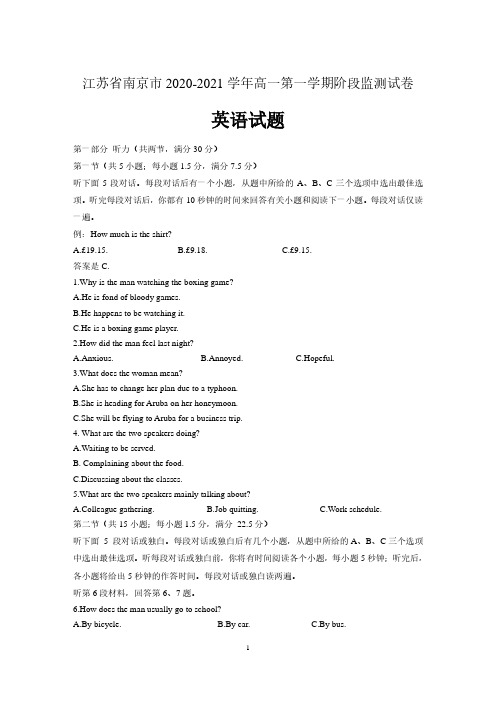
江苏省南京市2020-2021学年高一第一学期阶段监测试卷英语试题第一部分听力(共两节,满分30分)第一节(共5小题;每小题1.5分,满分7.5分)听下面5段对话。
每段对话后有一个小题,从题中所给的A、B、C三个选项中选出最佳选项。
听完每段对话后,你都有10秒钟的时间来回答有关小题和阅读下一小题。
每段对话仅读一遍。
例:How much is the shirt?A.£19.15.B.£9.18.C.£9.15.答案是C.1.Why is the man watching the boxing game?A.He is fond of bloody games.B.He happens to be watching it.C.He is a boxing game player.2.How did the man feel last night?A.Anxious.B.Annoyed.C.Hopeful.3.What does the woman mean?A.She has to change her plan due to a typhoon.B.She is heading for Aruba on her honeymoon.C.She will be flying to Aruba for a business trip.4. What are the two speakers doing?A.Waiting to be served.B. Complaining about the food.C.Discussing about the classes.5.What are the two speakers mainly talking about?A.Colleague gathering.B.Job quitting.C.Work schedule.第二节(共15小题;每小题1.5分,满分22.5分)听下面 5 段对话或独白。
2020-2021学年江苏省南京一中高一(上)10月段考数学试卷及答案

2020-2021学年江苏省南京一中高一(上)10月段考数学试卷一.单选题(每题只有一个选项是正确的,本题共10小题,每小题5分,共50分)1.(5分)设全集U={1,2,3,4},集合S={1,3},T={4},则(∁U S)∪T等于()A.{2,4}B.{4}C.∅D.{1,3,4} 2.(5分)命题“∀x>1,>1”的否定是()A.∃x 0>1,≤1B.∀x0>1,≤1C.∃x 0≤1,≤1D.∀x0≤1,≤13.(5分)设集合A={x|x2﹣4≤0},B={x|2x+a≤0},且A∩B={x|﹣2≤x≤1},则a=()A.﹣4B.﹣2C.2D.44.(5分)对于任意实数a,b,c,d,以下四个命题中的真命题是()A.若a>b,c≠0,则ac>bc B.若a>b>0,c>d,则ac>bdC.若a>b,则D.若ac2>bc2,则a>b5.(5分)已知集合P=,集合Q=,则P与Q的关系是()A.P=Q B.P⊆Q C.P⊇Q D.P∩Q=∅6.(5分)若x1,x2是一元二次方程2x2﹣6x+3=0的两个根,则|x1﹣x2|的值为()A.B.C.3D.7.(5分)若不等式ax2+bx+2>0的解集是{x|﹣<x<},则a+b的值为()A.﹣10B.﹣14C.10D.148.(5分)若关于x的不等式x2+mx+2m﹣3≤0有解,则实数m的取值范围是()A.[2,6]B.(﹣∞,2]∪[6,+∞)C.(2,6)D.(﹣∞,2)∪(6,+∞)9.(5分)若正数x,y满足x+3y=xy,则3x+4y的最小值为()A.24B.25C.28D.3010.(5分)已知x,y为正实数,则的最小值为()A.B.C.D.3二、多项选择婀,本题共4小题,每小题5分,共20分.在每小题给出的选项中,有多项符合题目要求全部选对的得5分,部分选对的得3分,有选错的得0分.11.(5分)已知关于x的不等式ax2+bx+3>0,关于此不等式的解集有下列结论,其中正确的是()A.不等式ax2+bx+3>0的解集可以是{x|x>3}B.不等式ax2+bx+3>0的解集可以是RC.不等式ax2+bx+3>0的解集可以是{x|﹣1<x<3}D.不等式ax2+bx+3>0的解集可以是∅12.(5分)若集合M⊆N,则下列结论正确的是()A.M∩N=M B.M∪N=N C.M⊆(M∩N)D.(M∪N)⊆N 13.(5分)对任意实数a,b,c,下列命题为真命题的是()A.“a=b”是“ac=bc”的充要条件B.“a>b”是“a2>b2”的充分条件C.“a<5”是“a<3”的必要条件D.“a+5是无理数”是“a是无理数”的充要条件14.(5分)已知a>0、b>0,则下列不等式一定成立的是()A.++2≥4B.(a+b)(+)≥4C.≥a+b D.≥三、填空题(每题5分,共20分)15.(5分)当取得最小值时,x=.16.(5分)函数f(x)=(x>1)的最小值是.17.(5分)已知A={x∈R|x<﹣2,或x>3},B={x∈R|a≤x≤2a﹣1},若A∩B=B,则实数a的取值范围为.18.(5分)已知函数y=x2+ax+b(a,b∈R)的最小值为0,若关于x的不等式x2+ax+b<c 的解集为(m,m+6),则实数c的值为.四.解答题(本大题共5小题,满分60分)19.(12分)已知集合A={x|x<﹣1},B={x|x≥2},C={x|﹣2<x≤2}.(1)求A∪C,C∩B,∁R(A∪B);(2)当C={x∈N|﹣2<x≤2}时,写出C的所有非空真子集.20.(12分)化简下列各式(1)()6﹣4()﹣•80.25﹣(﹣2.015)0;(2)(a>0,b>0).21.(12分)给定两个命题,p:对于任意实数x都有ax2+ax+1>0恒成立;q:关于x的方程x2﹣x+a=0有实数根.(1)若p为真,求实数a的取值范围;(2)如果p与q中至少有一个为真命题,求实数a的取值范围;(3)如果p与q中有且仅有一个为真命题,求实数a的取值范围.22.(12分)某货轮匀速行驶在相距300海里的甲、乙两地间运输货物,运输成本由燃料费用和其他费用组成.已知该货轮每小时的燃料费用与其航行速度的平方成正比(比例系数为0.5),其他费用为每小时800元,且该货轮的最大航行速度为50海里/时.(1)请将该货轮从甲地到乙地的运输成本y(元)表示为航行速度x(海里/时)的函数;(2)要使从甲地到乙地的运输成本最少,该货轮应以多大的航行速度行驶?23.(12分)设x,y∈R,求证:|x+y|=|x|+|y|成立的充要条件是xy≥0.2020-2021学年江苏省南京一中高一(上)10月段考数学试卷参考答案与试题解析一.单选题(每题只有一个选项是正确的,本题共10小题,每小题5分,共50分)1.(5分)设全集U={1,2,3,4},集合S={1,3},T={4},则(∁U S)∪T等于()A.{2,4}B.{4}C.∅D.{1,3,4}【分析】利用集合的交、并、补集的混合运算求解.【解答】解:∵全集U={1,2,3,4},集合S={l,3},T={4},∴(∁U S)∪T={2,4}∪{4}={2,4}.故选:A.【点评】本题考查集合的交、并、补集的混合运算,是基础题,解题时要认真审题.2.(5分)命题“∀x>1,>1”的否定是()A.∃x 0>1,≤1B.∀x0>1,≤1C.∃x 0≤1,≤1D.∀x0≤1,≤1【分析】根据全称命题的否定是特称命题进行判断.【解答】解:全称命题的否定是特称命题,则命题的否定是:∃x 0>1,≤1,故选:A.【点评】本题主要考查含有量词的命题的否定,比较基础.3.(5分)设集合A={x|x2﹣4≤0},B={x|2x+a≤0},且A∩B={x|﹣2≤x≤1},则a=()A.﹣4B.﹣2C.2D.4【分析】由二次不等式和一次不等式的解法,化简集合A,B,再由交集的定义,可得a 的方程,解方程可得a.【解答】解:集合A={x|x2﹣4≤0}={x|﹣2≤x≤2},B={x|2x+a≤0}={x|x≤﹣a},由A∩B={x|﹣2≤x≤1},可得﹣a=1,则a=﹣2.故选:B.【点评】本题考查集合的交集运算,同时考查不等式的解法,考查方程思想和运算能力,是一道基础题.4.(5分)对于任意实数a,b,c,d,以下四个命题中的真命题是()A.若a>b,c≠0,则ac>bc B.若a>b>0,c>d,则ac>bdC.若a>b,则D.若ac2>bc2,则a>b【分析】对于A,c>0时,结论成立,c<0时,结论不成立;对于B,c>d>0时,结论成立,0>c>d时,结论不成立;对于C,a=1,b=﹣1,结论不成立;对于D,根据c2>0,若ac2>bc2则a>b,故可得结论.【解答】解:对于A,c>0时,结论成立,c<0时,结论不成立,故A为假命题;对于B,c>d>0时,结论成立,0>c>d时,结论不成立,故B为假命题;对于C,a=1,b=﹣1,结论不成立,故C为假命题;对于D,∵c2>0,若ac2>bc2则a>b,故D为真命题;故选:D.【点评】本题以不等式为载体,考查命题的真假判断,熟练掌握不等式的性质是关键.5.(5分)已知集合P=,集合Q=,则P与Q的关系是()A.P=Q B.P⊆Q C.P⊇Q D.P∩Q=∅【分析】根据题意,分析可得P={x|x≥﹣1},Q={x|x≥0},结合集合子集的定义,分析可得答案.【解答】解:根据题意,集合P=表示函数y=的定义域,即P={x|x ≥﹣1}集合Q=表示函数y=的定义域,即Q={x|x≥0}分析可得Q是P的子集,即P⊇Q;故选:C.【点评】本题考查集合的表示方法.关键是注意到集合P、Q的不同意义.6.(5分)若x1,x2是一元二次方程2x2﹣6x+3=0的两个根,则|x1﹣x2|的值为()A.B.C.3D.【分析】利用根与系数关系进行求解.【解答】解:△=(﹣6)2﹣4×2×3=12>0,所以方程有两个不等实根.则,易知:,所以,所以.故选:B.【点评】本题考查根与系数关系的灵活运用,属于基础题.7.(5分)若不等式ax2+bx+2>0的解集是{x|﹣<x<},则a+b的值为()A.﹣10B.﹣14C.10D.14【分析】将不等式解集转化为对应方程的根,然后根据韦达定理求出方程中的参数a,b,从而求出所求.【解答】解:∵不等式ax2+bx+2>0的解集为(﹣,)∴﹣,为方程ax2+bx+2=0的两个根∴根据韦达定理:﹣+=﹣①﹣×=②由①②解得:∴a+b=﹣14故选:B.【点评】本题主要考查了一元二次不等式的应用,以及韦达定理的运用和一元二次不等式解集与所对应一元二次方程根的关系,属于中档题.8.(5分)若关于x的不等式x2+mx+2m﹣3≤0有解,则实数m的取值范围是()A.[2,6]B.(﹣∞,2]∪[6,+∞)C.(2,6)D.(﹣∞,2)∪(6,+∞)【分析】不等式x2+mx+2m﹣3≤0有解,等价于方程x2+mx+2m﹣3=0有实根,再利用△≥0 即可求出m的取值范围.【解答】解∵关于x的不等式x2+mx+2m﹣3≤0有解,∴方程x2+mx+2m﹣3=0有实根,∴△≥0,即m2﹣4(2m﹣3)≥0,解得m≤2或m≥6,∴实数m的取值范围是:(﹣∞,2]∪[6,+∞),故选:B.【点评】本题主要考查了二次函数的图象和性质,是基础题.9.(5分)若正数x,y满足x+3y=xy,则3x+4y的最小值为()A.24B.25C.28D.30【分析】利用“乘1法”与基本不等式的性质即可得出.【解答】解:∵正数x,y满足x+3y=xy,∴.则3x+4y=(3x+4y)=13+≥13+2=25,当且仅当x=2y =5时取等号.∴3x+4y的最小值为25.故选:B.【点评】本题“乘1法”与基本不等式的性质,属于基础题.10.(5分)已知x,y为正实数,则的最小值为()A.B.C.D.3【分析】根据基本不等式的性质求出代数式的最小值即可.【解答】解:∵x,y为正实数,∴=+(1+)﹣1≥2﹣1=4﹣1=3,当且仅当即x=3y时“=”成立,故选:D.【点评】本题考查了基本不等式的性质,注意应用性质的条件,本题是一道基础题.二、多项选择婀,本题共4小题,每小题5分,共20分.在每小题给出的选项中,有多项符合题目要求全部选对的得5分,部分选对的得3分,有选错的得0分.11.(5分)已知关于x的不等式ax2+bx+3>0,关于此不等式的解集有下列结论,其中正确的是()A.不等式ax2+bx+3>0的解集可以是{x|x>3}B.不等式ax2+bx+3>0的解集可以是RC.不等式ax2+bx+3>0的解集可以是{x|﹣1<x<3}D.不等式ax2+bx+3>0的解集可以是∅【分析】在A项中,a=0,且3b+3=0,解得b=﹣1,此时不等式为﹣x+3>0,解得x <3,即可判断A项错误;在B项中,取a=1,b=2,即可判断B项正确;在C项中,依题意可得a<0,且,即可判断C项正确.在D选中,取特殊值,令x=0,即可判断D选错误;【解答】解:在A项中,依题意可得a=0,且3b+3=0,解得b=﹣1,此时不等式为﹣x+3>0,解得x<3,故A项错误;在B项中,取a=1,b=2,可得x2+2x+3=(x+1)2+2>0,解集为R,故B项正确;在C项中,依题意可得a<0,且,解得,符合题意,故C项正确.在D选中,当x=0时,ax2+bx+3=3>0,可得其解集不为∅,故D选错误;故选:BC.【点评】本题主要考查了不等式的解法,考查运算求解能力,属于基础题.12.(5分)若集合M⊆N,则下列结论正确的是()A.M∩N=M B.M∪N=N C.M⊆(M∩N)D.(M∪N)⊆N 【分析】利用子集、并集、交集的定义直接求解.【解答】解:∵集合M⊆N,∴在A中,M∩N=M,故A正确;在B中,M∪N=N,故B正确;在C中,M⊆M∩N,故C正确;在D中,M∪N⊆N,故D正确.故选:ABCD.【点评】本题考查命题真假的判断,考查子集、并集、交集定义等基础知识,考查运算求解能力,是基础题.13.(5分)对任意实数a,b,c,下列命题为真命题的是()A.“a=b”是“ac=bc”的充要条件B.“a>b”是“a2>b2”的充分条件C.“a<5”是“a<3”的必要条件D.“a+5是无理数”是“a是无理数”的充要条件【分析】由题意逐一考查所给的命题是否成立即可.【解答】解:逐一考查所给的选项:取a=2,b=3,c=0,满足ac=bc,但是不满足a=b,选项A错误,取a=2,b=﹣3,满足a>b,但是不满足a2>b2,选项B错误,“a<5”是“a<3”的必要条件,选项C正确,“a+5是无理数”,则“a是无理数”,选项D正确,故选:CD.【点评】本题主要考查不等式的性质,等式的性质,命题真假的判定等知识,属于中等题.14.(5分)已知a>0、b>0,则下列不等式一定成立的是()A.++2≥4B.(a+b)(+)≥4C.≥a+b D.≥【分析】对各式转化变形,然后直接利用基本不等式求解即可.【解答】解:∵++2≥2+2=2(+)≥2×2=4(当且仅当a=b=1时取“=“),∴A正确;∵(a+b)(+)≥2×2=4(当且仅当a=b时取“=“),∴B正确;∵(a+b)≤•(a+b)=≤=a2+b2(当且仅当a =b时取“=“),∴≥a+b(当且仅当a=b时取“=“),∴C正确;∵a+b≥2,∴≤=,∴D错误.故选:ABC.【点评】本题主要考查基本不等式的应用,属于中档题.三、填空题(每题5分,共20分)15.(5分)当取得最小值时,x=4.【分析】结合已知配凑为积为定值后,直接利用基本不等式即可求解.【解答】解:因为,当且仅当,即x=4时,等号成立.故答案为:4【点评】本题主要考查了利用基本不等式求解最值,属于基础试题.16.(5分)函数f(x)=(x>1)的最小值是2.【分析】由f(x)===2(x﹣1)+,利用基本不等式即可求出.【解答】解:∵x>1,∴x﹣1>0,∴f(x)===2(x﹣1)+=2,当且仅当2(x﹣1)=时取等号,即x=1+时,函数f(x)=的最小值为2,故答案为:2.【点评】本题考查基本不等式的应用,属于基础题.17.(5分)已知A={x∈R|x<﹣2,或x>3},B={x∈R|a≤x≤2a﹣1},若A∩B=B,则实数a的取值范围为(﹣∞,1)∪(3,+∞).【分析】由A∩B=B,得B⊆A,当B=∅时,a>2a﹣1,当B≠∅时,或,由此能求出实数a的取值范围.【解答】解:∵A={x∈R|x<﹣2,或x>3},B={x∈R|a≤x≤2a﹣1},A∩B=B,∴B⊆A,当B=∅时,a>2a﹣1,解得a<1,当B≠∅时,或,解得a>3,∴实数a的取值范围是(﹣∞,1)∪(3,+∞).故答案为:(﹣∞,1)∪(3,+∞).【点评】本题考查实数的取值范围的求法,考查交集定义等基础知识,考查运算求解能力,是基础题.18.(5分)已知函数y=x2+ax+b(a,b∈R)的最小值为0,若关于x的不等式x2+ax+b<c的解集为(m,m+6),则实数c的值为9.【分析】根据函数的值域求出a与b的关系,然后根据不等式的解集可得f(x)=c的两个根为m,m+6,最后利用根与系数的关系建立等式,解之即可.【解答】解:∵函数f(x)=x2+ax+b(a,b∈R)的值域为[0,+∞),∴f(x)=x2+ax+b=0只有一个根,即△=a2﹣4b=0,则4b=a2不等式f(x)<c的解集为(m,m+6),即为x2+ax+b<c解集为(m,m+6),则x2+ax+b﹣c=0的两个根x1,x2分别为m,m+6∴两根之差为|x1﹣x2|=|m+6﹣m|=6根据韦达定理可知:x1+x2=﹣a,x1x2=b﹣c,∵|x1﹣x2|=6,∴=6,∴=6,∴=6,解得:c=9,故答案为:9.【点评】本题主要考查了一元二次不等式的应用,以及根与系数的关系,同时考查了分析求解的能力和计算能力,属于中档题.四.解答题(本大题共5小题,满分60分)19.(12分)已知集合A={x|x<﹣1},B={x|x≥2},C={x|﹣2<x≤2}.(1)求A∪C,C∩B,∁R(A∪B);(2)当C={x∈N|﹣2<x≤2}时,写出C的所有非空真子集.【分析】(1)根据并集、交集和补集的定义,计算即可;(2)根据非空真子集的定义,写出即可.【解答】解:集合A={x|x<﹣1},B={x|x≥2),C={x|﹣2<x≤2};(1)所以A∪C={x|x≤2};C∩B={2};又A∪B={x|x<﹣1或x≥2},所以∁R(A∪B)={x|﹣1≤x<2};(2)C={x∈N|﹣2<x≤2}={0,1,2}时,C的所有非空真子集为:{0},{1},{2},{0,1},{0,2},{1,2}.【点评】本题考查了集合的定义与运算问题,是基础题.20.(12分)化简下列各式(1)()6﹣4()﹣•80.25﹣(﹣2.015)0;(2)(a>0,b>0).【分析】(1)(2)利用指数幂的运算性质即可得出.【解答】解:(1)原式=﹣4×﹣×﹣1=4×27﹣7﹣(2×8)﹣1=108﹣7﹣2﹣1=98;(2)原式====.【点评】本题考查了指数幂的运算性质,属于基础题.21.(12分)给定两个命题,p:对于任意实数x都有ax2+ax+1>0恒成立;q:关于x的方程x2﹣x+a=0有实数根.(1)若p为真,求实数a的取值范围;(2)如果p与q中至少有一个为真命题,求实数a的取值范围;(3)如果p与q中有且仅有一个为真命题,求实数a的取值范围.【分析】(1)由恒成立问题,可得a=0或,解得a得取值范围;(2)若命题q为真,则△≥0,解得a≤,p和q中至少有一个为真命题,分三种情况①如果p真q假,②如果p假q真,③如果p真q真,解得a的取值范围;(3)如果p与q中有且仅有一个为真命题,分两种情况①如果p真q假,②如果p假q 真,解得a的取值范围.【解答】解:(1)因为p:对于任意实数x都有ax2+ax+1>0恒成立;所以a=0或,所以0<a≤.(2)因为q:关于x的方程x2﹣x+a=0有实数根.所以△=1﹣4a≥0,解得a≤,p和q中至少有一个为真命题,①如果p真q假,则由0≤a<4且a>,得<a<4.②如果p假q真,则由a<0或a≥4,且a≤,得a<0,③如果p真q真,则由0≤a<4且a≤,得0≤a≤.所以实数a的取值范围为(﹣∞,4).(3)如果p与q中有且仅有一个为真命题,①如果p真q假,则由0≤a<4且a>,得<a<4.②如果p假q真,则由a<0或a≥4且a≤,得a<0,综上,a的取值范围为(﹣∞,0)或(,4).【点评】本题考查简易逻辑和不等式恒成立问题,解题中要注意审题,弄明白题意再做,属于基础题.22.(12分)某货轮匀速行驶在相距300海里的甲、乙两地间运输货物,运输成本由燃料费用和其他费用组成.已知该货轮每小时的燃料费用与其航行速度的平方成正比(比例系数为0.5),其他费用为每小时800元,且该货轮的最大航行速度为50海里/时.(1)请将该货轮从甲地到乙地的运输成本y(元)表示为航行速度x(海里/时)的函数;(2)要使从甲地到乙地的运输成本最少,该货轮应以多大的航行速度行驶?【分析】(1)从甲地到乙地的运输成本y(元)=每小时的燃料费用×时间+每小时其它费用×时间;(2)用基本不等式求解即可.【解答】解:(1)由题意,每小时的燃料费用为:0.5x2(0<x⩽50),从甲地到乙地所用的时间为小时,则从甲地到乙地的运输成本:.(2)由(1)得,当且仅当,即x=40 时取等号.故当货轮航行速度为40 海里/小时时,能使该货轮运输成本最少.【点评】本题考查了由函数模型建立目标函数,利用基本不等式求函数最值的问题,属于中档题.23.(12分)设x,y∈R,求证:|x+y|=|x|+|y|成立的充要条件是xy≥0.【分析】证明充要条件关键是证明其互相推出性,要根据|x+y|=|x|+|y|证明出xy≥0,也要在xy≥0下证明出|x+y|=|x|+|y|.【解答】解:证明:充分性:如果xy=0,那么,①x=0,y≠0②x≠0,y=0③x=0,y =0于是|x+y|=|x|+|y|明显成立.如果xy>0即x>0,y>0或x<0,y<0,当x>0,y>0时,|x+y|=x+y=|x|+|y|,当x<0,y<0时,|x+y|=﹣x﹣y=(﹣x)+(﹣y)=|x|+|y|,总之,当xy≥0时,|x+y|=|x|+|y|.必要性:由|x+y|=|x|+|y|及x,y∈R,得(x+y)2=(|x|+|y|)2即x2+2xy+y2=x2+2|xy|+y2,得|xy|=xy所以xy≥0故必要性成立,综上,原命题成立.故结论成立.【点评】本题考查了绝对值的定义,充分必要条件的判断,注意分类讨论思想在解决该题中的运用,属于基础题.。
高中地理必修一 第二章 地球上的大气(能力提升)20202021学年高一单元测试定心卷(含答案)
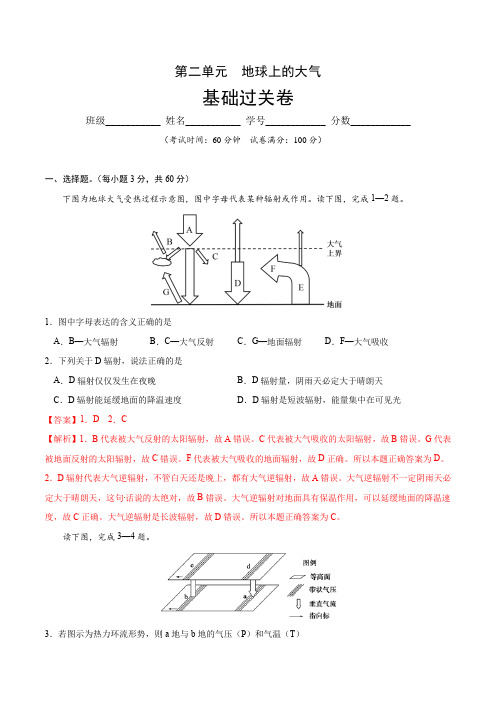
第二单元地球上的大气基础过关卷班级___________ 姓名___________ 学号____________ 分数____________(考试时间:60分钟试卷满分:100分)一、选择题。
(每小题3分,共60分)下图为地球大气受热过程示意图,图中字母代表某种辐射或作用。
读下图,完成1—2题。
1.图中字母表达的含义正确的是A.B—大气辐射B.C—大气反射C.G—地面辐射D.F—大气吸收2.下列关于D辐射,说法正确的是A.D辐射仅仅发生在夜晚B.D辐射量,阴雨天必定大于晴朗天C.D辐射能延缓地面的降温速度D.D辐射是短波辐射,能量集中在可见光【答案】1.D 2.C【解析】1.B代表被大气反射的太阳辐射,故A错误。
C代表被大气吸收的太阳辐射,故B错误。
G代表被地面反射的太阳辐射,故C错误。
F代表被大气吸收的地面辐射,故D正确。
所以本题正确答案为D。
2.D辐射代表大气逆辐射,不管白天还是晚上,都有大气逆辐射,故A错误。
大气逆辐射不一定阴雨天必定大于晴朗天,这句话说的太绝对,故B错误。
大气逆辐射对地面具有保温作用,可以延缓地面的降温速度,故C正确。
大气逆辐射是长波辐射,故D错误。
所以本题正确答案为C。
读下图,完成3—4题。
3.若图示为热力环流形势,则a地与b地的气压(P)和气温(T)A.Pa>Pb;Ta>Tb B.Pa<Pb;Ta<Tb C.Pa<Pb;Ta>Tb D.Pa>Pb;Ta<Tb4.若图示地区在北半球,理论上,a与b、c与d之间的稳定风向分别为A.西南风、东风B.东北风、东风C.东北风、南风D.西南风、南风【答案】3.D 4.A【解析】3.读图可知,a处气流下沉,形成高气压,则b处气流上升,形成低气压,因此a地与b地的气压值的关系是Pa>Pb,B、C错误;热力环流中近地面热的地方气体上升,冷的地方气体下沉,冷的地方气压高,热的地方气压低,由于判断,a处气温较低,b处气温较高,即Ta<Tb,A错误、D正确。
(新高考地区新教材)2020-2021学年高一上学期第一次月考备考金卷语文试卷(A卷)(解
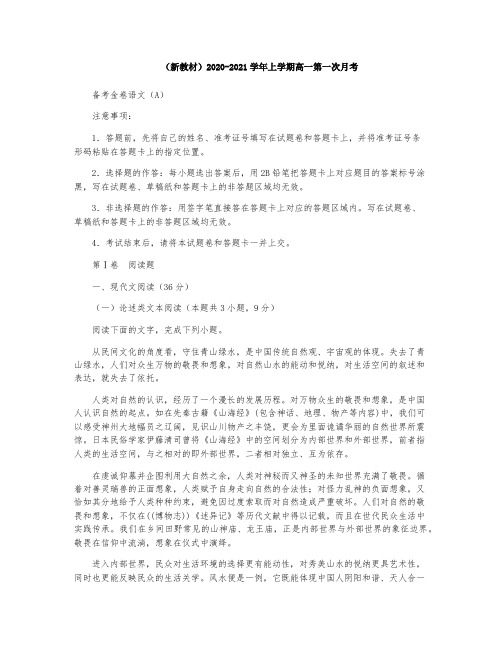
(新教材)2020-2021学年上学期高一第一次月考备考金卷语文(A)注意事项:1.答题前,先将自己的姓名、准考证号填写在试题卷和答题卡上,并将准考证号条形码粘贴在答题卡上的指定位置。
2.选择题的作答:每小题选出答案后,用2B铅笔把答题卡上对应题目的答案标号涂黑,写在试题卷、草稿纸和答题卡上的非答题区域均无效。
3.非选择题的作答:用签字笔直接答在答题卡上对应的答题区域内。
写在试题卷、草稿纸和答题卡上的非答题区域均无效。
4.考试结束后,请将本试题卷和答题卡一并上交。
第Ⅰ卷阅读题一、现代文阅读(36分)(一)论述类文本阅读(本题共3小题,9分)阅读下面的文字,完成下列小题。
从民间文化的角度看,守住青山绿水,是中国传统自然观、宇宙观的体现。
失去了青山绿水,人们对众生万物的敬畏和想象,对自然山水的能动和悦纳,对生活空间的叙述和表达,就失去了依托。
人类对自然的认识,经历了一个漫长的发展历程。
对万物众生的敬畏和想象,是中国人认识自然的起点。
如在先秦古籍《山海经》(包含神话、地理、物产等内容)中,我们可以感受神州大地幅员之辽阔,见识山川物产之丰饶,更会为里面诡谲华丽的自然世界所震惊。
日本民俗学家伊藤清司曾将《山海经》中的空间划分为内部世界和外部世界,前者指人类的生活空间,与之相对的即外部世界,二者相对独立、互为依存。
在虔诚仰慕并企图利用大自然之余,人类对神秘而又神圣的未知世界充满了敬畏。
循着对善灵瑞兽的正面想象,人类赋予自身走向自然的合法性;对怪力乱神的负面想象,又恰如其分地给予人类种种约束,避免因过度索取而对自然造成严重破坏。
人们对自然的敬畏和想象,不仅在((博物志))《述异记》等历代文献中得以记载,而且在世代民众生活中实践传承。
我们在乡间田野常见的山神庙、龙王庙,正是内部世界与外部世界的象征边界。
敬畏在信仰中流淌,想象在仪式中演绎。
进入内部世界,民众对生活环境的选择更有能动性,对秀美山水的悦纳更具艺术性,同时也更能反映民众的生活关学。
2020年高考真题北京卷数学试卷-学生用卷
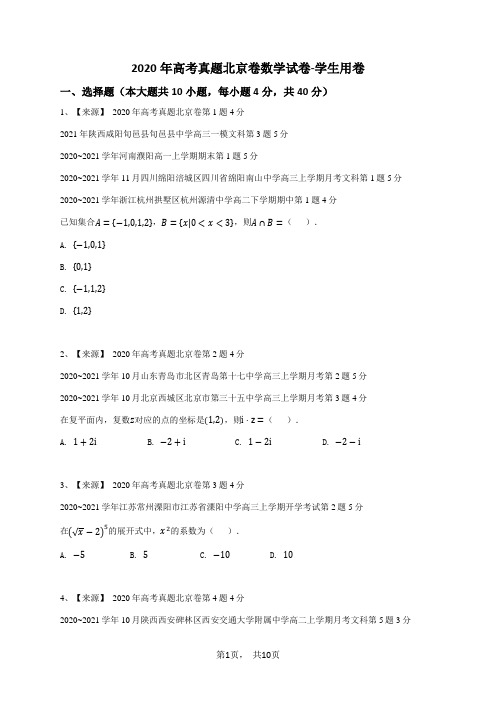
2020年高考真题北京卷数学试卷-学生用卷一、选择题(本大题共10小题,每小题4分,共40分)1、【来源】 2020年高考真题北京卷第1题4分2021年陕西咸阳旬邑县旬邑县中学高三一模文科第3题5分2020~2021学年河南濮阳高一上学期期末第1题5分2020~2021学年11月四川绵阳涪城区四川省绵阳南山中学高三上学期月考文科第1题5分2020~2021学年浙江杭州拱墅区杭州源清中学高二下学期期中第1题4分已知集合A={−1,0,1,2},B={x|0<x<3},则A∩B=().A. {−1,0,1}B. {0,1}C. {−1,1,2}D. {1,2}2、【来源】 2020年高考真题北京卷第2题4分2020~2021学年10月山东青岛市北区青岛第十七中学高三上学期月考第2题5分2020~2021学年10月北京西城区北京市第三十五中学高三上学期月考第3题4分在复平面内,复数z对应的点的坐标是(1,2),则i⋅z=().A. 1+2iB. −2+iC. 1−2iD. −2−i3、【来源】 2020年高考真题北京卷第3题4分2020~2021学年江苏常州溧阳市江苏省溧阳中学高三上学期开学考试第2题5分在(√x−2)5的展开式中,x2的系数为().A. −5B. 5C. −10D. 104、【来源】 2020年高考真题北京卷第4题4分2020~2021学年10月陕西西安碑林区西安交通大学附属中学高二上学期月考文科第5题3分某三棱柱的底面为正三角形,其三视图如图所示,该三棱柱的表面积为().A. 6+√3B. 6+2√3C. 12+√3D. 12+2√35、【来源】 2020年高考真题北京卷第5题4分2020~2021学年湖南长沙雨花区雅礼中学高二上学期期中(雅礼教育集团)第6题5分2020~2021学年安徽合肥肥东县肥东县第二中学高二下学期期末文科第9题5分2020~2021学年12月四川眉山仁寿县仁寿县第一中学(北校区)高二上学期月考第6题5分2020~2021学年10月江苏南京秦淮区南京市第一中学高二上学期月考第3题5分已知半径为1的圆经过点(3,4),则其圆心到原点的距离的最小值为().A. 4B. 5C. 6D. 76、【来源】 2020年高考真题北京卷第6题4分已知函数f(x)=2x−x−1,则不等式f(x)>0的解集是().A. (−1,1)B. (−∞,−1)∪(1,+∞)C. (0,1)D. (−∞,0)∪(1,+∞)7、【来源】 2020年高考真题北京卷第7题4分设抛物线的顶点为O,焦点为F,准线为l,P是抛物线上异于O的一点,过P作PQ⊥l于Q,则线段FQ的垂直平分线().A. 经过点OB. 经过点PC. 平行于直线OPD. 垂直于直线OP8、【来源】 2020年高考真题北京卷第8题4分2020~2021学年10月陕西西安碑林区西安交通大学附属中学高二上学期月考理科第9题3分2020~2021学年10月陕西西安碑林区西安交通大学附属中学高二上学期月考文科第10题3分在等差数列{a n}中,a1=−9,a5=−1,记T n=a1a2⋯a n(n=1,2,⋯),则数列{T n}().A. 有最大项,有最小项B. 有最大项,无最小项C. 无最大项,有最小项D. 无最大项,无最小项9、【来源】 2020年高考真题北京卷第9题4分已知α,β∈R,则“存在k∈Z使得α=kπ+(−1)kβ”是“sinα=sinβ”的().A. 充分而不必要条件B. 必要而不充分条件C. 充分必要条件D. 既不充分也不必要条件10、【来源】 2020年高考真题北京卷第10题4分2020~2021学年广东广州天河区华南师范大学附属中学高一上学期周测(第五章测试卷)第4题2020~2021学年3月陕西西安碑林区西安市铁一中学高一下学期月考第9题4分2020年3月14日是全球首个国际圆周率日(πDay ).历史上,求圆周率π的方法有多种,与中国传统数学中的“割圆术”相似,数学家阿尔·卡西的方法是:当正整数n 充分大时,计算单位圆的内接正6n 边形的周长和外切正6n 边形(各边均与圆相切的正6n 边形)的周长,将它们的算术平均数作为2π的近似值.按照阿尔·卡西的方法,π的近似值的表达式是( ).A. 3n (sin30°n +tan30°n )B. 6n (sin30°n +tan30°n )C. 3n (sin60°n +tan60°n )D. 6n (sin60°n +tan60°n )二、填空题(本大题共5小题,每小题5分,共25分)11、【来源】 2020年高考真题北京卷第11题5分2020~2021学年广东广州越秀区广州大学附属中学高一下学期期中(三校联考)第13题5分 2020~2021学年广东广州南沙区广州外国语学校高一下学期期中(三校联考)第13题5分 2020~2021学年广东广州越秀区广州市铁一中学高一下学期期中(三校联考)第13题5分 函数f (x )=1x+1+lnx 的定义域是 .12、【来源】 2020年高考真题北京卷第12题5分已知双曲线C :x 26−y 23=1,则C 的右焦点的坐标为 ;C 的焦点到其渐近线的距离是 .13、【来源】 2020年高考真题北京卷第13题5分已知正方形ABCD 的边长为2,点P 满足AP →=12(AB →+AC →),则|PD →|= ,PB →⋅PD →= .14、【来源】 2020年高考真题北京卷第14题5分2020~2021学年广东广州天河区华南师范大学附属中学高一上学期周测[ 校本作业5.5.2(1)] 第1题若函数f(x)=sin(x+φ)+cosx的最大值为2,则常数φ的一个取值为.15、【来源】 2020年高考真题北京卷第15题5分2020~2021学年10月北京西城区西城外国语学校高三上学期月考第15题5分2020~2021学年10月北京朝阳区清华大学附属中学朝阳学校高三上学期月考第16题5分2020~2021学年黑龙江哈尔滨道里区哈尔滨市第九中学校高三上学期开学考试文科第16题5分2020~2021学年12月陕西西安雁塔区西安交通大学第二附属中学(南校区)高二上学期月考理科第15题5分为满足人民对美好生活的向往,环保部门要求相关企业加强污水治理,排放未达标的企业要限期的大小评价在[a,b]这段时整改.设企业的污水排放量W与时间t的关系为W=f(t),用−f(b)−f(a)b−a间内企业污水治理能力的强弱.已知整改期内,甲、乙两企业的污水排放量与时间的关系如下图所示.给出下列四个结论:①在[t1,t2]这段时间内,甲企业的污水治理能力比乙企业强;②在t2时刻,甲企业的污水治理能力比乙企业强;③在t3时刻,甲、乙两企业的污水排放都已达标;④甲企业在[0,t1],[t1,t2],[t2,t3]这三段时间中,在[0,t1]的污水治理能力最强.其中所有正确结论的序号是.三、解答题(本大题共6小题,共85分. 解答应写出文字说明,演算步骤或证明过程.)16、【来源】 2020年高考真题北京卷第16题13分2020~2021学年北京东城区北京市第一七一中学高二上学期期中第16题如图,在正方体ABCD−A1B1C1D1中,E为BB1中点.(1) 求证:BC1//平面AD1E.(2) 求直线AA1与平面AD1E所成角的正弦值.17、【来源】 2020年高考真题北京卷第17题13分2020~2021学年10月山东青岛市南区青岛第一中学高三上学期月考第17题2020~2021学年9月北京西城区北京市第七中学高三上学期月考第18题14分2020~2021学年12月广东广州荔湾区广州市真光中学高三上学期月考第17题在△ABC中,a+b=11,再从条件①、条件②这两个条件中选择一个作为已知,求:条件①:c=7,cosA=−17;条件②:cosA=18,cosB=916.注:如果选择条件①和条件②分别解答,按第一个解答计分.(1) a的值.(2) sinC和△ABC的面积.18、【来源】 2020年高考真题北京卷第18题14分2020~2021学年北京海淀区清华大学附属中学高三上学期开学考试第17题14分2020~2021学年12月北京东城区北京市第五中学高三上学期月考第18题某校为举办甲、乙两项不同活动,分别设计了相应的活动方案:方案一、方案二.为了解该校学生对活动方案是否支持,对学生进行简单随机抽样,获得数据如下表:假设所有学生对活动方案是否支持相互独立.(1) 分别估计该校男生支持方案一的概率、该校女生支持方案一的概率.(2) 从该校全体男生中随机抽取2人,全体女生中随机抽取1人,估计这3人中恰有2人支持方案一的概率.(3) 将该校学生支持方案二的概率估计值记为p0.假设该校一年级有500名男生和300名女生,除一年级外其他年级学生支持方案二的概率估计值记为p1.试比较p0与p1的大小.(结论不要求证明)19、【来源】 2020年高考真题北京卷第19题15分2020~2021学年宁夏石嘴山惠农区石嘴山市第一中学高三上学期期中第21题12分已知函数f(x)=12−x2.(1) 求曲线y=f(x)的斜率等于−2的切线方程.(2) 设曲线y=f(x)在点(t,f(t))处的切线与坐标轴围成的三角形的面积为S(t),求S(t)的最小值.20、【来源】 2020年高考真题北京卷第20题15分2020~2021学年广东深圳宝安区深圳市宝安中学高中部高二下学期期中第21题12分2020~2021学年浙江宁波奉化区高二下学期期末第22题15分已知椭圆C:x 2a2+y2b2=1过点A(−2,−1),且a=2b.(1) 求椭圆C的方程.(2) 过点B(−4,0)的直线l交椭圆C于点M,N.直线MA,NA分别交直线x=−4于点P,Q.求|PB||BQ|的值.21、【来源】 2020年高考真题北京卷第21题15分 已知{a n }是无穷数列.给出两个性质:①对于{a n }中任意两项a i ,a j (i >j),在{a n }中都存在一项a m ,使得a i 2a j =a m ;②对于{a n }中任意一项a n (n ⩾3),在{a n }中都存在两项a k ,a l (k >l),使得a n =a k 2a l . (1) 若a n =n (n =1,2,⋯),判断数列{a n }是否满足性质①,说明理由.(2) 若a n =2n−1(n =1,2,⋯),判断数列{a n }是否同时满足性质①和性质②,说明理由.(3) 若{a n }是递增数列,且同时满足性质①和性质②,证明:{a n }为等比数列.1 、【答案】 D;2 、【答案】 B;3 、【答案】 C;4 、【答案】 D;5 、【答案】 A;6 、【答案】 D;7 、【答案】 B;8 、【答案】 B;9 、【答案】 C;10 、【答案】 A;11 、【答案】 (0,+∞);12 、【答案】 (3,0);√3;13 、【答案】 √5;−1;14 、【答案】 π2(答案不唯一,符合φ=π2+2kπ,k ∈Z 即可);15 、【答案】 ①②③;16 、【答案】 (1) 证明见解析.;(2) 23.;17 、【答案】 (1) 选择条件①:a=8;选择条件②:a=6.;(2) 选择条件①:sinC=√32,S△ABC=6√3;选择条件②:sinC=√74,S△ABC=15√74.;18 、【答案】 (1) 男生支持方案一概率为:13;女生支持方案一概率为:34.;(2) 1336.;(3) p0>p1.;19 、【答案】 (1) 2x+y−13=0.;(2) 32.;20 、【答案】 (1) x28+y22=1.;(2) 1.;21 、【答案】 (1) 不满足,证明见解析.;(2) 满足,证明见解析.;(3) 证明见解析.;。
江苏省2020-2021学年高一上学期数学期中试题汇编04:函数的概念与性质【填选题】(答案版)
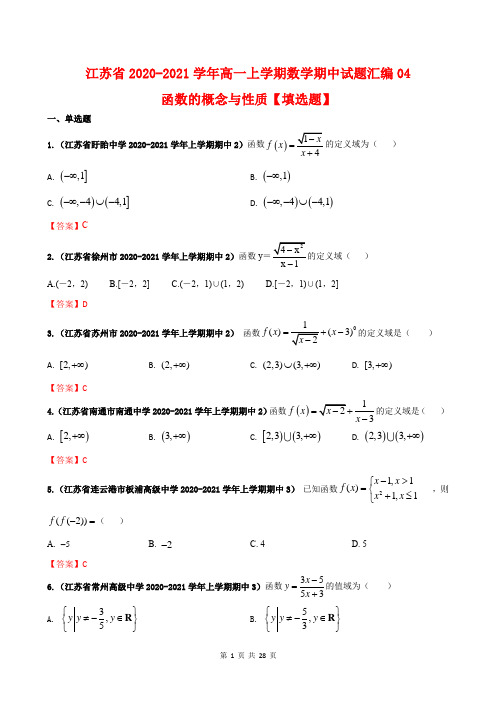
8.(江苏省南京市第十二中学2020-2021学年上学期期中4)下面各组函数中表示同个函数的是()
A. , B. ,
C. , D. ,
【答案】B
【解析】对于A, 的定义域为 ,而 的定义域为 ,两函数的定义域不相同,所以不是同一函数;
对于B,两个函数的定义域都为 ,定义域相同, ,所以这两个函数是同一函数;
A.0B.2
C.4D.-2
【答案】B
【解析】取 ,则 ,
因为函数为奇函数,则 , 即 ,
整理可得 ,即 .故选:B
10.(江苏省南通市西亭高级中学2020-2021学年上学期期中4)已知函数 ,若 =10,则实数a的值为()
A 5B.9C.10D.11
【答案】B
【解析】由 ,令 ,则 .
因为 ,所以a=9.故选:B
A.-4 B.5 C.14 D.23
【答案】C
【解析】由题意可设 ,则当 时, 单调,且 ≥0恒成立,因为 的对称轴方程为 ,则 或 ,解得6≤a≤17或-3≤a≤-2,即 ,则只有14满足题意,故答案选C.
23.(江苏省南通市西亭高级中学2020-2021学年上学期期中6)已知 是偶函数,且其定义域为 ,则 的值是()
【答案】C
【解析】满足条件的函数的定义域为 、 、 、 、 、 、 、 、 ,共 个.故选:C.
18.(江苏省南京市南师附中2020-2021学年上学期期中5)函数 的值域为( )
A. B. C. D.
【答案】D
19.(江苏省南通市西亭高级中学2020-2021学年上学期期中5)已知函数 的值域是()
C.[-4,-1]∪[0,2]D.(-∞,-1]∪[0,2]
2020-2021学年上学期高一期中地理试题及答案
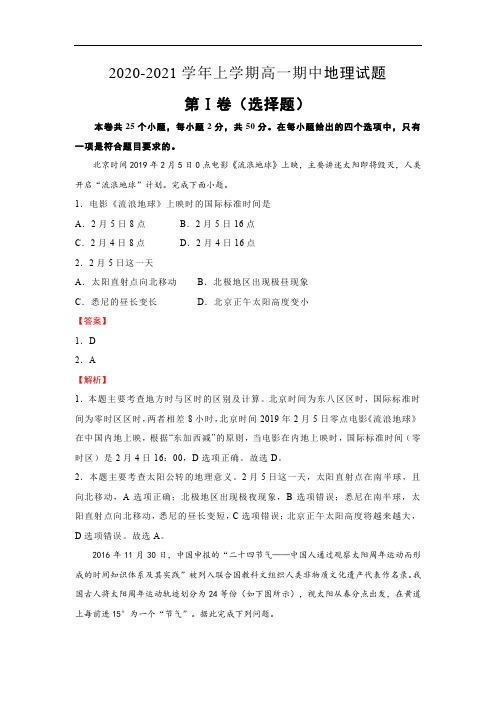
2020-2021学年上学期高一期中地理试题第Ⅰ卷(选择题)本卷共25个小题,每小题2分,共50分。
在每小题给出的四个选项中,只有一项是符合题目要求的。
北京时间2019年2月5日0点电影《流浪地球》上映,主要讲述太阳即将毁灭,人类开启“流浪地球”计划。
完成下面小题。
1.电影《流浪地球》上映时的国际标准时间是A.2月5日8点B.2月5日16点C.2月4日8点D.2月4日16点2.2月5日这一天A.太阳直射点向北移动B.北极地区出现极昼现象C.悉尼的昼长变长D.北京正午太阳高度变小【答案】1.D2.A【解析】1.本题主要考查地方时与区时的区别及计算。
北京时间为东八区区时,国际标准时间为零时区区时,两者相差8小时,北京时间2019年2月5日零点电影《流浪地球》在中国内地上映,根据“东加西减”的原则,当电影在内地上映时,国际标准时间(零时区)是2月4日16:00,D选项正确。
故选D。
2.本题主要考查太阳公转的地理意义。
2月5日这一天,太阳直射点在南半球,且向北移动,A选项正确;北极地区出现极夜现象,B选项错误;悉尼在南半球,太阳直射点向北移动,悉尼的昼长变短,C选项错误;北京正午太阳高度将越来越大,D选项错误。
故选A。
2016年11月30日,中国申报的“二十四节气——中国人通过观察太阳周年运动而形成的时间知识体系及其实践”被列入联合国教科文组织人类非物质文化遗产代表作名录。
我国古人将太阳周年运动轨迹划分为24等份(如下图所示),视太阳从春分点出发,在黄道上每前进15°为一个“节气”。
据此完成下列问题。
3.从立秋到立冬太和县可能出现A.白昼时间不断变短B.日出时刻越来越早C.正午日影逐渐变短D.正午日影朝向正南4.下列节气中,太和县的正午日影长度最接近且较长的是A.春分与秋分B.大雪与小寒C.夏至与冬至D.芒种与小暑【答案】3.A4.B【解析】试题考查太阳直射点的回归运动、正午太阳高度的季节变化。
江苏南通徐州宿迁淮安泰州镇江六市联考2020-2021学年下高三第一次调研考试数学试题(全解析)
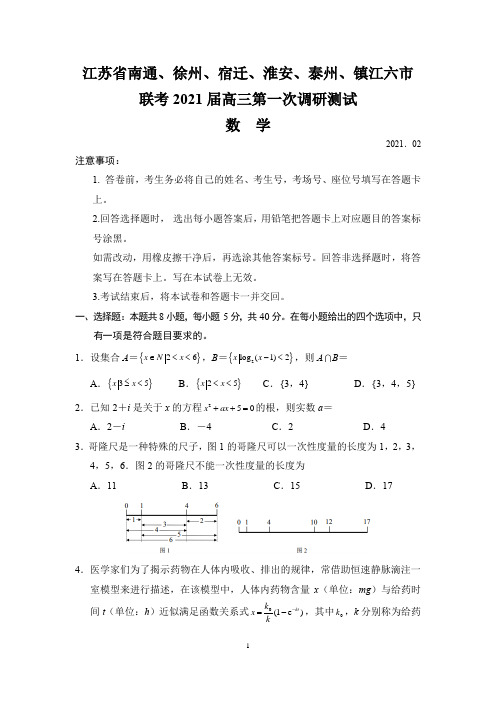
江苏省南通、徐州、宿迁、淮安、泰州、镇江六市联考2021届高三第一次调研测试数 学2021.02注意事项:1. 答卷前,考生务必将自己的姓名、考生号,考场号、座位号填写在答题卡上。
2.回答选择题时, 选出每小题答案后,用铅笔把答题卡上对应题目的答案标号涂黑。
如需改动,用橡皮擦干净后,再选涂其他答案标号。
回答非选择题时,将答案写在答题卡上。
写在本试卷上无效。
3.考试结束后,将本试卷和答题卡一并交回。
一、选择题:本题共8小题,每小题 5分,共 40分。
在每小题给出的四个选项中,只有一项是符合题目要求的。
1.设集合A ={}26x N x ∈<<,B ={}2log (1)2x x -<,则A B =A .{}35x x ≤<B .{}25x x <<C .{3,4}D .{3,4,5} 2.已知2+i 是关于x 的方程250x ax ++=的根,则实数a =A .2-iB .-4C .2D .4 3.哥隆尺是一种特殊的尺子,图1的哥隆尺可以一次性度量的长度为1,2,3,4,5,6.图2的哥隆尺不能一次性度量的长度为A .11B .13C .15D .174.医学家们为了揭示药物在人体内吸收、排出的规律,常借助恒速静脉滴注一室模型来进行描述,在该模型中,人体内药物含量x (单位:mg )与给药时间t (单位:h )近似满足函数关系式0(1e )kt k x k-=-,其中0k ,k 分别称为给药速率和药物消除速率(单位:mg /h ).经测试发现,当t =23时,02k x k=,则该药物的消除速率k 的值约为(ln2≈0.69) A .3100 B .310 C .103 D .10035.(12)n x -的二项展开式中,奇数项的系数和为 A .2nB .12n - C .(1)32n n -+ D .(1)32n n--6.函数sin 21xy x π=-的图象大致为A BC D 7.已知点P 是△ABC 所在平面内一点,有下列四个等式: 甲:PA PB PC ++=0; 乙:()()PA PA PB PC PA PB ⋅-=⋅-; 丙:PA PB PC ==; 丁:PA PB PB PC PC PA ⋅=⋅=⋅. 如果只有一个等式不成立,则该等式为A .甲B .乙C .丙D .丁8.已知曲线ln y x =在A (1x ,1y ),B (2x ,2y )两点处的切线分别与曲线e x y =相切于C (3x ,3y ),D (4x ,4y ),则1234x x y y +的值为A .1B .2C .52D .174二、 选择题:本大题共4小题,每小题5分, 共计20分.在每小题给出的选项中,有多项符合题目要求。
2020-2021学年江苏省南京市鼓楼区高一(上)期中数学试卷(附答案详解)
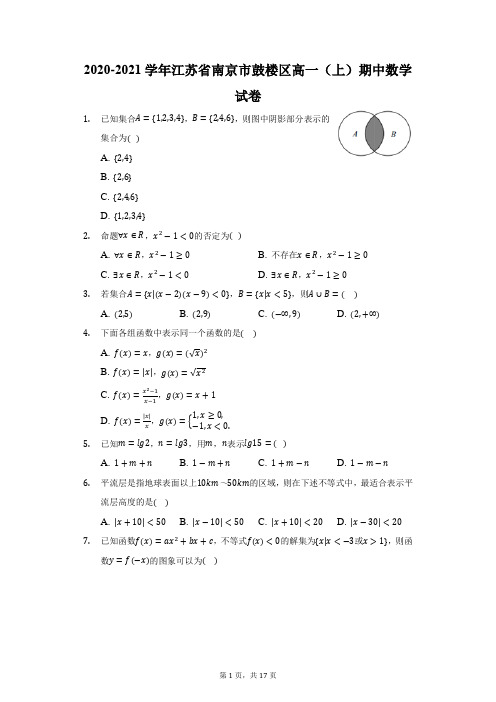
2020-2021学年江苏省南京市鼓楼区高一(上)期中数学试卷1.已知集合A={1,2,3,4},B={2,4,6},则图中阴影部分表示的集合为()A. {2,4}B. {2,6}C. {2,4,6}D. {1,2,3,4}2.命题∀x∈R,x2−1<0的否定为()A. ∀x∈R,x2−1≥0B. 不存在x∈R,x2−1≥0C. ∃x∈R,x2−1<0D. ∃x∈R,x2−1≥03.若集合A={x|(x−2)(x−9)<0},B={x|x<5},则A∪B=()A. (2,5)B. (2,9)C. (−∞,9)D. (2,+∞)4.下面各组函数中表示同一个函数的是()A. f(x)=x,g(x)=(√x)2B. f(x)=|x|,g(x)=√x2C. f(x)=x2−1x−1,g(x)=x+1D. f(x)=|x|x ,g(x)={1,x≥0,−1,x<0.5.已知m=lg2,n=lg3,用m,n表示lg15=()A. 1+m+nB. 1−m+nC. 1+m−nD. 1−m−n6.平流层是指地球表面以上10km~50km的区域,则在下述不等式中,最适合表示平流层高度的是()A. |x+10|<50B. |x−10|<50C. |x+10|<20D. |x−30|<207.已知函数f(x)=ax2+bx+c,不等式f(x)<0的解集为{x|x<−3或x>1},则函数y=f(−x)的图象可以为()A. B.C. D.8.已知定义在R上的函数f(x)是奇函数,且f(x)在(−∞,0)上是减函数,f(3)=0,则不等式(x−1)f(x+2)≤0的解集是()A. (−∞,−5]∪[−2,+∞)B. (−∞,−2]∪[1,+∞)C. (−∞,−5]∪[1,+∞)D. [−5,−2]∪[1,+∞)9.下列四个命题中,是真命题的是()A. 若x>y,则x2>y2B. 两个三角形的面积相等是这两个三角形全等的充分不必要条件C. 若A∪B=A,则B⊆AD. ∀x∈R,x2+1x2+1≥110.下列各图中,可能是函数图象的是()A. B.C. D.11.高斯是德国著名的数学家,近代数学奠基者之一,享有“数学王子”的称号,用其名字命名的“高斯函数”如下:设x∈R,用[x]表示不超过x的最大整数,则y=[x]称为高斯函数.例如[−2.1]=−3,[3.1]=3,已知函数f(x)=x 2|x|+1,若函数y= [f(x)]的值域集合为Q,则下列集合是Q的子集的是()A. [0,+∞)B. {0,2}C. {1,2}D. {1,2,3}12.已知函数f(x)满足:∀x∈R,f(x+3)=f(1−x),且∀x1,x2∈[2,+∞),f(x1)−f(x2)x1−x2< 0(x1≠x2),则()A. f(0)>f(3)B. ∀x∈R,f(x)≤f(2)C. f(−a2+a+1)≤f(54) D. 若f(m)<f(3),则1<m<313.函数y=√4−x2的定义域是.14.十六、十七世纪之交,随着天文、航海、工程、贸易以及军事的发展,改进数字计算方法成了当务之急,数学家纳皮尔在研究天文学的过程中,为简化计算发明了对数直到十八世纪才由瑞士数学家欧拉发现了指数与对数的互逆关系,即a b=N⇔b=log a N,现在已知a=log48,b=log24,则4a=,a+b=.(用最简结果作答)15.设函数f(x)={x 2+x,x≤0−|x|,x>0,则f(f(−2))=.16.当两个集合中有一个集合为另一集合的子集时称这两个集合之间构成“全食”,当两个集合有公共元素,但互不为对方子集时称两集合之间构成“偏食”.对于集合A={−1,−12,12,1},B={x|ax2+1=0,a≤0},若A与B构成“全食”,或构成“偏食”,则a的取值集合为.17.计算;(1)(279)0.5+2log12√2的值;(2)已知m=lg2,10n=3,计算103m−2n2的值.18.已知f(x)=x2−4ax+3a2,其中a为实数.(1)当a=2时,判断命题p:∃x∈R,f(x)≤0的真假,并说明理由;(2)若∀x∈[1,2],f(x)≤0,求a的取值范围.19.中华人民共和国第十四届全运会将于2021年在陕西省举办,全运会会徽以及吉祥物已于2019年8月2日晚在西安市对外发布.某公益团队计划联系全运会组委会举办一场纪念品展销会,并将所获利润全部用于社区体育设施建设.据市场调查,当每套纪念品(一个会徽和一个吉祥物)售价定为x元时,销售量可达到(15−0.1x)万套.为配合这个活动,生产纪念品的厂家将每套纪念品的供货价格分为固定价格和浮动价格两部分,其中固定价格为50元,浮动价格(单位:元)与销售量(单位:万套)成反比,比例系数为10.约定不计其他成本,即销售每套纪念品的利润=售价−供货价格.(1)每套会徽及吉祥物售价为100元时,能获得的总利润是多少万元?(2)每套会徽及吉祥物售价为多少元时,单套的利润最大?最大值是多少元?20.(1)已知f(x)=(x−a)4+3时,当实数a为何值时,f(x)是偶函数?(2)已知g(x)是偶函数,且g(x)在[0,+∞)是增函数,如果当x∈[1,2]时g(x+a)≤g(x−6)恒成立,求实数a的取值范围.21.已知函数f(x)=|x2−ax|,其中a为实数.(1)当a=2时,画出函数f(x)的图象,并直接写出递增区间;(2)若f(x)在x∈[1,3]时的取值范围为[0,f(3)],求a的取值范围.+a.22.已知a∈R,f(x)=1x(1)若关于x的方程f(x)=(2−a)x+1的解集中恰好有一个元素,求a的取值范围;,1],函数f(x)在区间[t,t+1]上最大值不超过最小值的2倍,求a的取(2)若∀t∈[12值范围.答案和解析1.【答案】A【解析】【分析】本题考查维恩图,交集定义等基础知识,是基础题.图中阴影部分表示的集合为A∩B,由此能求出阴影部分表示的集合.【解答】解:∵集合A={1,2,3,4},B={2,4,6},∴图中阴影部分表示的集合为:A∩B={2,4}.故选:A.2.【答案】D【解析】【分析】本题主要考查含有量词的命题的否定,属于基础题.根据含有量词的命题的否定即可得到结论.【解答】解:命题为全称量词命题,则命题的否定为:∃x∈R,x2−1≥0,故选:D.3.【答案】C【解析】【分析】本题考查了描述法、区间的定义,一元二次不等式的解法,并集的运算,考查了计算能力,属于基础题.可以求出集合A,然后进行并集的运算即可.【解答】解:∵A={x|2<x<9},B={x|x<5},∴A∪B=(−∞,9).故选:C.4.【答案】B【解析】【分析】本题主要考查同一函数的判断,结合函数的定义域和对应法则是否相同是解决本题的关键.分别判断两个函数的定义域和对应法则是否相同即可求解.【解答】解:A.g(x)的定义域为[0,+∞),两个函数的定义域不相同,不是相同函数.B.g(x)=|x|,两个函数的定义域,对应法则相同是同一函数.C.f(x)=x+1,(x≠1),g(x)=x+1的定义域为R,两个函数的定义域不相同,不是同一函数.D.f(x)的定义域为{x|x≠0},两个函数的定义域不相同,不是同一函数.故选:B.5.【答案】B【解析】【分析】本题主要考查了对数的运算性质,是基础题.利用对数的运算性质求解.【解答】解:lg15=lg(3×5)=lg3+lg5=lg3+(1−lg2)=n+(1−m)=1−m+n,故选:B.6.【答案】D【解析】【分析】本题主要考查绝对值的意义,绝对值不等式的应用,属于基础题.由题意可得10≤x≤50,即−20≤x−30≤20,即|x−30|≤20,从而得出结论.【解答】解:平流层是指地球表面以上10km到50km的区域,若x能表示平流层高度,则10≤x≤50,所以−20≤x−30≤20,即|x−30|≤20,故选:D.7.【答案】B【解析】【分析】本题考查函数的图象,二次函数的性质的应用,涉及函数的零点,不等式的解集.利用二次函数与不等式的解集,判断开口方向,利用对称性推出所求函数的图象即可.【解答】解:函数f(x)=ax2+bx+c,不等式f(x)<0的解集为{x|x<−3或x>1},所以a<0,并且−3,1是函数的零点,函数y=f(−x)的图象与函数f(x)的图象关于y轴对称,所以函数y=f(−x)的图象可以是B.故选:B.8.【答案】A【解析】【分析】本题主要考查不等式的解法,利用函数的奇偶性和单调性之间的关系是解决本题的关键,综合考查函数性质的应用.根据函数奇偶性和单调性之间的关系列不等式,即可求解. 【解答】解:∵定义在R 上的函数f(x)是奇函数,且f(x)在(−∞,0)上是减函数,f(3)=0, ∴f(x)在(0,+∞)上是减函数,f(−3)=0,f(0)=0,∴x <−3或0<x <3时,f(x)>0,当−3<x <0或x >3时,f(x)<0,x =3或−3时f(x)=0,由(x −1)f(x +2)≤0可得,{x >1f(x +2)≤0或{x <1f(x +2)≥0或x =1,即{x >1−3≤x +2≤0或x +2≥3或{x <1x +2≤−3或0≤x +2≤3或x =1, 解得x ≤−5或x ≥−2. 故选:A .9.【答案】CD【解析】 【分析】本题考查命题的真假的判断,考查充分、必要条件,不等式的性质,基本不等式的应用,是基础题.反例判断A ;充分、必要条件判断三角形面积与全等关系,判断B ;并集的性质判断C ;基本不等式判断D 即可. 【解答】解:对于A ,若x =0>y =−1,则x 2<y 2,所以A 是假命题;对于B ,两个三角形的面积相等是这两个三角形全等的必要不充分条件,所以B 是假命题;对于C ,若A ∪B =A ,则B ⊆A ,是真命题; 对于D ,∀x ∈R ,x 2+1x 2+1=x 2+1+1x 2+1−1≥2√(x 2+1)⋅1x 2+1−1=2−1=1.当且仅当x =0时,取等号,所以D 是真命题. 故选:CD .10.【答案】ACD【解析】【分析】本题主要考查函数的定义,函数的图象特征,属于基础题.根据函数的定义,当自变量x在定义域内任意取一个值,都有唯一的一个函数值y与之对应,由此可得结论.【解答】解:B选项,x>0时有两个y值与之对应,不为函数,B错误,其它均符合函数的定义,故选:ACD.11.【答案】BCD【解析】【分析】本题考查了函数奇偶性和基本不等式的应用,还考查了对新定义的正确理解,属于中档题.利用新定义,根据函数的奇偶性及基本不等式求解即可.【解答】解:当x≥0时:f(x)=x21+x =(x+1)2−2(x+1)+11+x=(x+1)+11+x −2≥2√(x+1)×1x+1−2=0,当且仅当x=0时等号成立,即x≥0时,f(x)的值域是:[0,+∞),又∵f(x)是偶函数,∴f(x)的值域是:[0,+∞),∴Q=N,故BCD正确,A错误.故选:BCD.12.【答案】BC【解析】【分析】本题考查了函数的单调性,对称性问题,考查转化思想.求出函数的对称轴,根据函数的对称性和单调性判断各个选项即可.【解答】解:由∀x∈R,f(x+3)=f(1−x),则x+3+1−x2=2,故函数f(x)的图象关于x=2对称,由∀x1,x2∈[2,+∞),f(x1)−f(x2)x1−x2<0(x1≠x2),可得f(x)在[2,+∞)递减,结合函数的单调性和对称性得距x=2越近函数值越大,则显然A错误,B正确;对于C:|−a2+a+1−2|=|a2−a+1|≥34=|54−2|,故C正确;对于D:f(m)<f(3)时,m距x=2更远,则m>3或m<1,故D错误,故选:BC.13.【答案】[−2,2]【解析】【分析】本题考查了求函数的定义域问题,考查二次根式的性质,是一道基础题.根据二次根式的性质求出函数的定义域即可.【解答】解:由题意,得4−x2≥0,解得−2≤x≤2,故函数的定义域是[−2,2],故答案为:[−2,2].14.【答案】872【解析】【分析】本题考查了对数运算、换底公式,考查了推理能力与计算能力,属于基础题.利用对数运算、换底公式即可得出.【解答】解:a =log 48,b =log 24,则4a =4log 48=8,a +b =log 28log 24+2=32+2=72. 故答案为:8,72.15.【答案】−2【解析】【分析】本题考查函数值的求法,是基础题.推导出f(−2)=(−2)2−2=2,从而f(f(−2))=f(2),由此能求出结果.【解答】解:∵函数f(x)={x 2+x,x ≤0−|x|,x >0, ∴f(−2)=(−2)2−2=2,f(f(−2))=f(2)=−|2|=−2.故答案为:−2.16.【答案】{0,−1,−4}【解析】【分析】本题考查了对新定义的理解以及子集的概念,分类讨论的思想,容易忽略B =⌀的情况,但难度不大,属于基础题.理解利用新定义和子集的定义求解即可.【解答】解:(1)B =⌀,则a =0,A 与B 构成“全食”满足题意,(2)B ≠⌀,则a ≠0,B ={−√−1a ,√−1a},此时应构成“全食”, ∴√−1a =1或12,∴a =−1或−4,综上a 的取值集合为:{0,−1,−4},故答案为:{0,−1,−4}.17.【答案】解:(1)原式=(259)12+log 122=53−1=23; (2)∵m =lg2,∴10m =2,∴103m−2n 2=1032m−n =1032m10n =[(10m )3(10n )2]12=(89)12=2√23.【解析】本题主要考查了有理数指数幂的运算性质和对数的运算性质,是基础题.(1)利用有理数指数幂的运算性质和对数的运算性质求解;(2)先由m =lg2得到10m =2,把原式化为103m−2n 2=[(10m )3(10n )2]12,代入即可计算出结果.18.【答案】解:(1)该命题为真命题,当a =2时,f(x)=x 2−8x +12,当x =2时,f(2)=0,则命题p :∃x ∈R ,f(x)≤0,为真命题;(2)二次函数f(x)关于x =2a 对称,在(−∞,2a)上单调递减,在(2a,+∞)上单调递增, 则当32≤2a 时,f(x)的最大值为f(1),当32>2a 时,f(x)的最大值为f(2),则对∀x ∈[1,2],f(x)≤0恒成立,只需满足{f(1)≤0f(2)≤0,即{3a 2−4a +1≤03a 2−8a +4≤0, 整理得:{13≤a ≤123≤a ≤2,即23≤a ≤1. 故a 的取值范围为[23,1].【解析】本题考查的知识要点:命题真假的判定,特称量词命题,二次函数性质的应用,恒成立问题和全称量词命题的应用,主要考查学生的运算能力和转换能力及思维能力,属于中档题.(1)直接利用存在性问题的应用求出命题的真假;(2)利用全称量词命题的应用和恒成立问题的应用求出参数的取值范围.19.【答案】解:(1)每套会徽及吉祥物售价为100元时,销售量为15−0.1×100=5(万套),供货单价为50+105=52(元),总利润为5×(100−52)=240(万元),答:总利润为240万元.(2)销售量为15−0.1x,供货单价为50+1015−0.1x,单套利润为x−50−1015−0.1x =x−50+100x−150,因为15−0.1x>0,所以0<x<150,所以单套利润为y=x−50−1015−0.1x =−[(150−x)+100150−x]+100≤100−2√(150−x)×100150−x =80,当且仅当150−x=100150−x即x=140时,等号成立,所以每套会徽及吉祥物售价为140元时,单套的利润最大,最大值是80元.【解析】(1)先求出每套会徽及吉祥物售价为100元时的销售量,再求出供货单价,即可求出总利润.(2)由题意可知销售量为15−0.1x,供货单价为50+1015−0.1x,从而求出单套利润为x−50−1015−0.1x,再利用基本不等式即可求出单套利润的最大值.本题主要考查了函数的实际应用,考查了利用基本不等式求最值,是中档题.20.【答案】解:(1)当a=0时,f(x)=3+x4是偶函数,当a≠0,a≠−a,而f(a)−f(−a)=−(2a)4≠0,此时f(x)不可能是偶函数,所以a=0,(2)由g(x)为偶函数可知g(x+a)=g(|x+a|),g(x−6)=g(|x−6|)且|x+a|≥0,|x−6|≥0,由g(x)在[0,+∞)上单调递增及g(x+a)≤g(x−6)可知1≤x≤2时,|x+a|≤|x−6|=6−x恒成立,即1≤x≤2时,x−6≤x+a≤6−x恒成立,故−6≤a≤6−2x,又2≤6−2x≤4,所以−6≤a≤2.【解析】本题主要考查了函数奇偶性的判断及利用函数单调性及奇偶性解不等式,属于函数性质的综合应用,属于中档题.(1)由已知及偶函数的定义代入可求a ,(2)结合偶函数的定义及单调性,可列出不等式,求解即可得答案.21.【答案】解:(1)当a =2时,f(x)={x 2−2x,x ≤0或x ≥2−x 2+2x,0<x <2, ∴函数f(x)递增区间为(0,1)和(2,+∞);(2)解方程f(x)=0,可得x =0或x =a ,结合条件可知a 在[1,3]上,①当a =1时,符合题意,②当a =3时,不符合题意.③当1<a ≤2,f(x)={−x 2+ax,1≤x <a x 2−ax,a ≤x ≤3, f(x)在[1,a)上单调递减,在[a,3]上单调的递增,值需要f(3)≥f(1),解得a ≤52, 所以1<a ≤2;④当2<a ≤3时,f(x)={−x 2+ax,1≤x <a x 2−ax,a ≤x ≤3, ∴f(x)在[1,a 2)单调递增,在[a 2,a)上单调递减,在[a,3]上单调递增,显然f(1)≥0=f(a),所以只需要f(3)≥f(a 2),解得−6−6√2≤a ≤−6+6√2,所以2<a ≤−6+6√2,综上所述a 的取值范围为[1,−6+6√2].【解析】本题考查了分段函数,考查分类讨论思想,是一道拔高题.(1)当a =2时,f(x)={x 2−2x,x ≤0或x ≥2−x 2+2x,0<x <2,画图即可,并由图象可得函数的单调区间,(2)先求出方程的根,再分类讨论,根据函数单调性,即可求出a 的范围.22.【答案】解:(1)方程f(x)=(2−a)x +1,即方程1x +a =(2−a)x +1,其中x ≠0, 整理可得:(2−a)x 2+(1−a)x −1=0,显然x =0不是方程的根,所以方程(2−a)x 2+(1−a)x −1=0在R 上只有一解,当2−a =0即a =2时,符合题意,当2−a ≠0即a ≠2时,Δ=(1−a)2+4(2−a)=0,解得a =3,所以a ∈{2,3};(2)因为函数f(x)在(0,+∞)是单调递减,而任意t ∈[12,1],[t,t +1]⊆(0,+∞), 所以函数f(x)在[t,t +1]上单调递减,所以在[t,t +1]上,f(x)的最大值为f(t)=a +1t ,最小值为f(t +1)=a +1t+1, 由题意可得:任意t ∈[12,1],a +1t ≤2(a +1t+1)恒成立,即任意t ∈[12,1],g(t)=1t −2t+1−a ≤0恒成立,下面来说明g(t)的单调性, 任意t 1,t 2∈[12,1],且t 1<t 2,则g(t 1)−g(t 2)=(1t 1−2t 1+1−a)−(1t 2−2t 2+1−a)=1t 1−1t 2−(2t 1+1−2t 2+1)=(t 2−t 1)(t 1+t 2−t 1t 2+1)t 1t 2(t 1+1)(t 2+1), 因为12≤t 1<t 2≤1,所以t 1t 2(t 1+1)(t 1+1)>0,t 2−t 1>0,−t 1t 2+t 1+t 2+1>−1+t 1+t 2+1>0,所以g(t 1)−g(t 2)>0,即g(t)在[12,1]上单调递减,所以只需g(t)的最大值即g(12)=2−43−a ≤0,解得a ≥23,故a 的取值范围为[23,+∞).【解析】本题考查了函数的最值问题以及恒成立问题,涉及到函数的单调性以及一元二次方程根的情况,考查了学生的运算能力,属于拔高题.(1)化简方程,根据二次方程的性质求解即可;(2)先求出函数的最大值和最小值,然后根据已知最值的关系建立不等式,整理化简建立新函数,求出新函数的单调性,利用恒成立思想即可求解.。
南京市2020-2021学年度第一学期期末学情调研测试卷(高一语文)解析

66
• 高中 2021.6
特约主持/徐志伟
测评
社会关系是逐渐从一个一个人推出去的,是私人联系的增加, 社会范围是一根根私人联系所构成的网络,因之,我们传统社 会里所有的社会道德也只在私人群系中发生意义。
(选自费孝通《乡土中国·差序格局》) 材料二: 立传的通例,开首大抵该是“某,字某,某地人也”,而我 并不知道阿 Q 姓什么。有一回,他似乎是姓赵,但第二日便模 糊了。那是赵太爷的儿子进了秀才的时候,锣声镗镗的报到村 里来,阿 Q 正喝了两碗黄酒,便手舞足蹈的说,这于他也很光 采,因为他和赵太爷原来是本家,细细的排起来他还比秀才长 三辈呢。其时几个旁听人倒也肃然的有些起敬了。哪知道第 二天,地保便叫阿 Q 到赵太爷家里去;太爷一见,满脸溅朱, 喝道: “阿 Q,你这浑小子!你说我是你的本家么?” 阿 Q 不开口。 赵太爷愈看愈生气了,抢进几步说:“你敢胡说!我怎么 会有你这样的本家?你姓赵么?” 阿 Q 不开口,想往后退了;赵太爷跳过去,给了他一个嘴 巴。 “你怎么会姓赵!——你那里配姓赵!” 阿 Q 并没有抗辩他确凿姓赵,只用手摸着左颊,和地保 退出去了;外面又被地保训斥了一番,谢了地保二百文酒钱。 知道的人都说阿 Q 太荒唐,自己去招打;他大约未必姓赵,即 使真姓赵,有赵太爷在这里,也不该如此胡说的。此后便再没 有人提起他的氏族来,所以我终于不知道阿 Q 究竟什么姓。 (选自鲁迅《呐喊·阿 Q 正传》) 材料三: 家庭是政治生活伦理与行为的训练场。家庭仪式通过共 同参与,以及对特定人群的容括和排除而强化父系继嗣原则。 依照理学的训诫,全部家庭生活和活动都应围绕着祠堂来进 行。朱熹迈出了极端的一步:将宗族祭祖仪式的权力扩展到 整个血亲群体。随着宗族的扩张,对正确的居家仪式的考虑 也扩展开来,无论在社会意义上还是在地理意义上。普通家 庭通过设立自己的家祠认可这一社会秩序,以赢得尊重感、 祖先的庇护以及宗族的成员身份等。在晚期帝制期间,以祭坛 为中心的日常仪式将越来越多的普通人,甚至包括许多并无 识字之人的家庭,绑缚到一个秩序井然的社会空间当中。 (选自白馥兰《技术、性别、历史》) 2.活动一:为研讨的中心话题“差序格局”拟写一个词条, 帮助小组成员明晰其概念内涵。(30 字左右)(4 分) 3.活动二:《阿 Q 正传》中阿 Q 说他本来姓赵,可是赵 太爷不许他姓赵。有同学对“阿 Q 为什么在意姓赵”有困惑, 请结合材料帮助同学解惑。(4 分) 4.活动三:有同学提出,如今已经进入“后乡土时代”,
江苏省2020-2021学年高一上学期政治期中考试试卷(I)卷

江苏省2020-2021学年高一上学期政治期中考试试卷(I)卷姓名:________ 班级:________ 成绩:________一、单选题 (共29题;共58分)1. (2分) (2017高三上·上高月考) 人们对黄豆加工,做硬了是豆腐干,做稀了是豆腐脑,做薄了是豆腐皮,做没了是豆浆,放臭了是臭豆腐!这启示我们()①黄豆浑身都是宝,只要加工就会有价值②黄豆在市场运动的过程中才会产生价值③黄豆的多种功效,源于市场的高效配置④黄豆的自然属性是价值产生的物质载体A . ①④B . ②④C . ①③D . ②③【考点】2. (2分) 2018年国庆黄金周期间,小邱参加了旅行社组团标价为300元人民币/人的黄山一日游。
下山路上小邱又花100元人民币购买了一些黄山旅游景区的小纪念品。
在这里300元、100元执行的货币职能分别是()A . 价值尺度支付手段B . 流通手段价值尺度C . 贮藏手段流通手段D . 价值尺度流通手段【考点】3. (2分) (2017高一上·玉田期中) 在生活中,一种经济现象的出现往往会引起另一种现象的产生。
下列表述中,能体现这一关系的有()①自来水公司供水价格提高,会使居民生活用水量大幅减少②美元对人民币汇率下跌,赴美留学麵一般会降低③重大节假日免收小型客车通行费,导致居民消费与享受型为主④天津至上海的高铁开通,天津飞上海航班的客流量可能下降A . ①②B . ③④C . ②④D . ①③【考点】4. (2分) (2018高三下·阳高开学考) 2017年我国钢材出口绊脚石增多,美国对中国钢铁反倾销案件频出。
美国商务部就对华不锈钢板材反倾销和反补贴调查作出终裁,裁定中国企业63.86%-76.64%的反倾销税率和75.6%-90.71%的反补贴税率。
面对美国的反倾销和反补贴,我国企业应该()①依靠科技和管理降低商品价值量,形成新的竞争优势②改变国际化战略,坚持独立自主、自力更生③转变对外经济发展方式,优化出口商品结构④实施出口多元化战略,积极开拓国际市场A . ①②B . ②③C . ①④D . ③④【考点】5. (2分) (2018高一上·江门月考) 近日,广东省统计局公布了2015年1-5月广东商品房销售情况,其中销售面积达3281.46万平方米,销售额为2986.85亿元。
2020-2021学年度第一学期高一英语试卷(含答案)

2020-2021学年度第一学期高一英语试卷本试卷满分120分,答题时间100分钟,命题人:沈莹本试卷分第I卷(选择题)和第II卷(非选择题)两部分, 共120分第I卷第一部分阅读理解(共两节,满分50分)第一节(共15小题;每小题2・5分,满分37・5分)阅读下列短文,从每题所给的四个选项(A、B. C和D)中,选出最佳选项。
AΓm a StrOng believer that Iearning different IangUageS makes you IOOk quite good When you,re in a foreign COUntry and Can UnderStand and SPeak the IangUage.The IiSt below is 4 apps (计算机应用程序)that Will help you Iearn a foreign IangUage! YOU Can download (下载)them for free.Babbel-Learn LangUageSBabbel is an excellent IangUage tool to help you PrOgreSS SteP by SteP With Iearning a new language.lt helps you Iearn grammar along the Way as you WOrk your Way through the tasks and assignments (作业)∙ YOU need to Pay every month, but this Will Still be CheaPer than taking PhySiCal IeSSOnS With a teacher!Duolingo: LearIl LangUageS FreeThe app has many IangUageS to ChOOSe from and Will WOrk through the basics all the Way to advanced WOrdS and SentenCeS.Ifs all COmPIeteIy freetoo! It,s Well designed, IOOkS great and Wiil help you learn, remember and PrOgreSS With jUSt a IittIe bit Of time every day.Tandem: LangUage EXChangeRather than have you WOrk through tasks and memorize different things, the app IetS you InatCh With PeOPle WhO Share your interests but SPeak the IangUage you Want to Iearn.You Can then have text, VOiCe and VideO COnVerSatiOnS With PeOPIe WhO Want to Iearn your native IangUage, and in return you Iearn theirs, all by SimPly COmmUniCating With each Other.Its a great Way to Iearn With OnIy $1 a day.LearIl EngIiSh 一busuuThiS app is perfect if you Want to Iearn EngliSh.There are all SOrtS Of audio and ViSUal Iearning aids.You,Π find yourself WOrking through interactive (互动白勺)tests and Iearning tools for VOCabUIary and dialogue・1 ∙ WhiCh app SUitS best if you Want to Iear n through communication?A ∙ Babbel 一Learn LangUageSB ∙ Tandem: LangUage EXChangeC.Duolingo: Learn LangUageS FreeD ∙ Learn EngliSh 一busuu2. What is DUOlingO different from the Other three apps?A. Ifs COlnPIeteIy free to use.B ∙ It,s SPeCiany designed for EngliSh Iearning・C ∙ It,s UnSUitabIe for beginners.D.It t S the best app for EngliSh Iearning・3 ∙ What do the4 apps have in common?A. They COVer all IangUageS・B ∙ They are expensive・C.They COntain many tests.D.They are free to download・4. What is the PUrPOSe Of the passage?A. TO Sell apps to IangUage IearnerS・B ∙ TO introduce IangUage Iearning apps・C.TO teach IangUage IearnerS to USe apps.D.TO teach IangUageS through apps・BWhen recalling Iny high SChOOI-GOnZaga COlIege High School, I am excited.lt WaS founded in 1821, WhiCh WaS in the Center Part of D. C., Within the ShOUting CliStanCe(¢6^) Of the CaPitOl building・Seeing my OIder brother experience GOnZaga a few years before me, I had an idea Of how SPeCial this SChOOl WaS before my entering to SChOOLThrOUgh him, I COUId See the Pride and friendship among GOnZaga students.My true IOVe for GOnZaga, however, began in Iny freshman year.I remember during my freshman guidance(新生入学指导L the team SPirit OrganiZatiOn Sat OUr CIaSS down On the PIaygrOUnd and taught US all the game CheerS.I remember feeling a SenSe Of energy and Pride among these StUdentS that I had never experienced from a high SChOOl before I mean, it WaS just a high SChOOl一InUCh SChOOl Pride COUId these kids really have? BUt it WaS not just a high SChOOl, and it OnIy took a few football games for me to realize that I Went to the most PridefUl SChOOl in the D. C.I SPent the rest Of my first year Ineeting SOme Of the COOIeSt and InOSt interesting PeOPIe I have ever known.Some Of the funniest, SlnarteSt and kindestguys I have ever Inet Went to this SChOOLNO matter how athletic(擅长运动的)you Were Or how InUCh money your ParentS had, you Were just another GOnZaga kid.You Were friends With everyone.If you Went to GOnZaga, teacher Or student, you Were in On the joke.When my freshman Iife Came to an end, I began to UnderStand What it Ineant to be Part Of GOnZaga StUdentS.Serving the POOr right there On CamPUS at the MCKenna center, I got a VieW On POOr PeOPle that I Will VaIUe for the rest Of my life.Through football I Iearned how to develop better SeIf-COntrOl and built SOme Of the greatest friendships.In the classroom, I had Inany IaUghS With friends and teachers alike.I also Iearned how to Inanage my time and gained a IOt Of information, but most importantly, I Iearned how to PUt the WOrId and OtherS before myself.5∙ Why did the author COnSider GOnZaga COnege High SChOOl SPeCial before getting into it?A. BeCaUSe Of its IOng historyB ∙ BeCaUSe Of its excellent IOCatiOnC. BeCaUSe Of his brother's experiences there6∙ ACCOrding to the text, the freshman guidance ___________ ・A. made StUdentS feel energetic and PrOUdB ∙ Ied to the author,s IOVe for football gamesC.gave an introduction to the high SChOOlD.helped the author find the Pride and friendship7.What is the author,s PUrPOSe in Writing the IaSt paragraph?A. TO introduce the advantages Of his high SChOOLB ∙ TO ShOW he really IearnS a IOt in his high SChOOLC. TO State the importance Of high SChOOl education.D. TO explain how SPOrtS activities make StUdentS athletic・8.What Can be the best title for the text?A. HOW SPeCial my high SChOOl was.B ∙ The InemOrieS Of my IOVing high SChOOLC.HOW PrOUd I WaS Of my efforts in high SChOOLD.The ChanengeS during my high SChOOl years.CWe all Want to be SUCCeSSfUl in OUr work.But What happens When OUr achievements COme at the risk Of IOSing important friendships? If your friends didn,t receive What they Were hoping for, your SUCCeSS COUId make them feel Iike they l ve been "left in the dusf∖ BUt does that Inean that We ShOUIdn t t enjoy OUr achievements in CaSe We displease SOmeOne Or that We ShOUId feel SOrry for being SUCCeSSfUl When OtherS aren l t?ThOSe Of US WhO ValUe friendships and CIOSe WOrking relationships might feel embarrassed for achieving InOre than OUr friends.But We deserve(应得)oUr success, and nothing ShOUId take it away.Jealousy (嫉妒)is OnIy natural, but it,s Often UnreaSOnabIe, too.Your SUCCeSS is PrObabIy not COnneCted With your friends* PrOgreSS, SO you ShOUIdn,t feel bad about achieving your goals.If your friends Stay UnfriendIy, don,t be afraid to keep yourself away from them.You are not responsible for their weaknesses, and nor ShOUId they treat you harshly(∕τR IjJ⅛)for improving your work.On the Other hand, your friends may think highly Of your recent SUCCeSS WhiIe hiding their real feelings.They COUId be jealous, angry Or Sad that they are not PrOgreSSing at the SaIne rate.So, be CarefUl not to boast.It's a thin Iine between Pride and Self-importance, and by CrOSSing the line, you may risk IOSing team SUPPOrt・NeXt time you Want to boast about your end-of year win, Or high-class new OffiCe, COnSider your IiStenerS.Maybe your friends narrowly IniSSed OUt On a POSitiOn raising, Or experienced Pay CUtS WhiCh Ineant they didn,t get What they Were expecting.If your WOrk is On a rising path, it doesn,t Inean that f s the CaSe for everyone.PerhaPS a SteP forward in your WOrk has Ineant that you don,t SPend as InUCh time With your friends as you USed to.If you,ve Changed a post.or moved to a new OffiCe, take the time to Stay in touch With OId friends.Chances are that in the build-up to your SUCCeSS you,ve built StrOng relationships along the way.Don t t Iet that hard WOrk go to WaSte by IOSing touch With them.9∙ FrOm the first two paragraphs, it Can be inferred that _______________ .A. We ShOUId enjoy OUr deserving SUCCeSSB ∙ OUr SUCCeSS Wiil CertainIy hurt OUr friendsC.friends Wiil SUrely help US achieve SUCCeSSD.OUr SUCCeSS is COnneCted With OUr friends1 PrOgreSS10. λVlιich Of the following best explains ςςboasf,Underlined in ParagraPh 3 ?A ∙ ShOW up.B ∙ Stand out.C. TaIk big. D・ KeeP silent.11 ∙ What ShOUId We do if OUr friends SUPPOrt OUr success?A. ImPrOVe OUrSeIVeS greatly・B ∙ COnSider their feelings.C.HeIP them make PrOgreSS・D.Make them PrOUd Of us.DFOreign ViSitOrS to the UK Inight be disappointed When they Iearn that not everyone there SPeakS Iike Harry POtter and his ually, there f s anassumption by Inany non-Brits that everyone in Britain SPeakS With what,s known as a ReCeiVed PrOnUnCiatiOn (RP,标准发音)accent, also Caned ςςthe QUeen,s English". However, WhiIe Inany PeOPIe do talk this way, InOSt BritOnS SPeak in their OWn regional accents・Scouse, GIaSWegian and BIaCk COUntry-from LiVeIPOOh GlaSgOW and the WeSt MidIandS一are just three Of the COUntIeSS non-RP accents that BritiSh PeOPIe SPeak with.There are even differences in accents between towns Or CitieS just 30 kilometers apart.What is even more disappointing is that not SPeaking in a RP accent may mean a BritiSh PerSOn is judged Or even treated differently in their everyday life.In a 2015 StUdy by The UniVerSity Of SOUth Wales, VideOS Of PeOPIe reading a PaSSage in three Clifferent UK accents Were ShOWn to a SeCOnd group Of PeOPIe.The group then rated how intelligent they thought the readers SOUnded.The IOWeSt-rated accent WaS Brummie, native to PeOPIe from Birmingham, a City WhOSe accent is COnSidered WOrking class.However, there is no need to be disappointed though you are not SPeaking in an RP accent.In fact, doing the OPPoSite may even give you Strength ・KOng SeOng-jae,25 , is an internet CeIebrity from SeOULAfter StUdying in the UK, he PiCked UP SeVeral regional accents.He,s now famous for his Online videos, Where he ShOWS Off the VariOUS accents he f s Ieanled/'British PeOPle USUally get really excited When I USe SOme Of their IOCal dialect WOrdS, and they become InUCh more friandly .1 think it makes a bit Of bond between IOCal PeOPIe and foreigners to SPeak in theirIOCal accent?5 Ile Said.SO if you,re WOrking On PerfeCting your BritiSh accent, try to SPeak Iike SOmeOne from LiVerPOOl, GIaSgOW Or Birmingham.You may not SOUnd IikeHarry Potter, but you are IikeIy to make InOre friends.12∙ What Can We infer from ParagraPh 1?A. NOn-BritS USUalIy hold that all BritOnS SPeak in a RP accent.B ∙ OnIy "the queen,s English” is accepted ill the UK.C.FOreign ViSitOrS are CliSaPPOinted at their OWn SPOken EngliSh・D.Any ReCeiVed PrOnUnCiatiOn around the WOlid is also CalIed "the QUeen,s English=13∙ What do PeOPIe think Of the BrUmmie accent?A. FaVOred by foreign ViSitOrS to the UK.B ∙ CIOSeSt to the RP accent・C. Smart and easy to UnderStand・D∙ SPOken by PeOPIe Of IOWer class.14.What does the Underlined PhraSe "doing the opposite" in ParagraPh 4 refer to?A. SPeaking in a RP accent.B ∙ SPeaking in regional accents・C.SPeaking the BrUmmie accent.D.SPeaking Iike HaITy POtter.15.What is the PaSSage mainly about?A. A StUdy about the InOSt intelligent accent in Britain・B ∙ A COmPariSOn between different BritiSh accents.C.HOW InUCh BritiSh PeOPle VaIUe the RP accent.D.The impact Of regional accents On people's IiVeS.第二节•阅读七选五(共5小题;每小题2・5分,满分12・5分)根据短文内容,从短文后的选项中找出能填入空白处的最佳选项。
- 1、下载文档前请自行甄别文档内容的完整性,平台不提供额外的编辑、内容补充、找答案等附加服务。
- 2、"仅部分预览"的文档,不可在线预览部分如存在完整性等问题,可反馈申请退款(可完整预览的文档不适用该条件!)。
- 3、如文档侵犯您的权益,请联系客服反馈,我们会尽快为您处理(人工客服工作时间:9:00-18:30)。
2020-2021学年南京一中(上学期)高一年级周测II.阅读理解(共15题;每小题2分,满分30分)阅读下列短文,从每题所给的A、B、C和D四个选项中,选出最佳选项。
ACarl Lewis holds the record as the only man to capture the gold in the 100-meter, 200-meter, long jump, and 4*100-meter relay at the same Olympic Games. He has been a member of five Olympic teams, but it wasn’t until the 1984 Games in Los Angeles that he came into his own, winning the 100-meter, 200-meter, long jump, and 4*100-meter relay. He continued to create history at the 1988 Games in Seoul, where he won the 100-meter and the long jump for a second time. In 1992 in Barcelona, Carl won the long jump and 4*100-meter relay again. Carl Lewis finally finished competing in 1996 in Atlanta where he won the long jump.He happens to live right down the street from me, so I decided to interview the greatest Olympian of all time.1.When you started running, did you realize that you were going to be great?No, I was awful when I started! I was 5’5” until the end of tenth grade, but by the time I graduated I was six feet. I’m sure I would have quit if it hadn’t been for my parents telling me not to give up.2.What thoughts went through your mind before a race? What did you tell yourself?Leading up to the race, I’d go over my race technique. But once I stepped into the block, I would try to relax and clear my mind so the only thing I could hear was the gun going off. While I was actually running, I had to be aware of what was happening, but I couldn’t let that affect my race. I had to run my own race.3.What advice would you give athletes?Never give up. I was supposed to give up, but because my mom was the best liar on earth, telling me I would grow and that I was good at running, I continued to run. And you know how people say, “You can be whatever you want to be.” You just have to be a leader, no a follower, choose to make a difference, and you will be whatever you aspire to be.21. In which of the following did Carl Lewis win gold medals twice?A. 100-meter and the long jump.B. 4 * 100-meter relay and 100-meter.C. The long jump and 200-meter.D. 100-meter and 200-meter.22. What can be learned about Carl Lewis from the passage?A. He noticed nothing else but his running during the race.B. He has altogether participated in four Olympic Games.C. He was so determined that he never thought of quitting his sports.D. He couldn’t have succeeded without his parents’ encouragement.23. The underlined word “awful” in the passage is closest in meaning to.A. terribleB. confidentC. greatD. shortBBullied (受欺凌的) kids face a high risk of mental health problems as teens and as young adults. Indeed, kids troubled by bullying may be worse off than those who had suffered physical abuse (虐待) or neglect, as the study found.Until recently, most studies of child victims focused not on bullying but on maltreatment (虐待), Dieter Wolke says. Maltreatment includes physical or emotional abuse, neglect or other behaviors that can harm a child.Wolke’s team wanted to better understand bullying’s long-term effects compared to those due to maltreatment. They focused on 4,026 children in the United Kingdom and 1,420 more in the United States. Information about bullying and maltreatment was collected for American children to age 13. They collected the same information for British youth up to age 16. The researchers also gathered data on each individual’s mental health as a young adult.Among the Americans, 36 percent of bullied kids had mental problems later. Those problems included anxiety, which is a state of excessive worry. They also included depression. That is a feeling of hopelessness that can last a long time. Among kids who had been maltreated by adults, 17 percent later suffered mental health problems. That was less than half the rate seen in people who had been bullied as school kids.In the U.K. group, the difference was less dramatic. Roughly 25 percent of the bullied kids reported mental health problems later, compared with about 17 percent who had been maltreated. But however you look at it, the findings are disturbing. And that’s why Wolke says schools, health services and otheragencies must work together to end bullying.Studies like this are important, says Corinna Jenkins Tucker. They bring attention to the lasting impacts of bullying. Tucker does, however, question the value of comparing bullying to other types of abuse. Such an approach can make it seem like one type of bad experience is worse than the other, she says. In fact, both types have short-term and long-term effects on health. She’d like to see researchers study the big picture. They should try to understand how all of these negative experiences together shape children ---and sometimes harm them.24. It can be inferred from the passage that ______.A. researchers should pay less attention to maltreatmentB. more bullied kids have mental problems in the USAC. a similar number of children are maltreated in America and BritainD. either bullying or maltreatment has negative effects on children’s health25. The purpose of the author’s writing this passage is to .A. advertiseB. informC. CompareD. Entertain26. The passage is most probably taken from ______.A. a news sectionB. a science sectionC. a culture sectionD. an entertainment section27. In Tucker’s opinion, Wolke’s study is ______.A. disappointingB. ImprovableC. satisfactoryD. nonsenseCPhysical education, or gym class, isn’t required for all high school students. In some schools, it isn’t offered for some different reasons. But should high school students have physical education? The answer is certainly “yes”.Today many people don’t do sports. But as is known to all, doing sports is very important for an adult. Teaching teens the importance of a healthy lifestyle and making fitness plans now can help teens put exercise in the first place as an adult.High school isn’t that easy. Many students are under a lot of stress. Stress can be harmful to a student’s studies and life. Doing sports can help them deal with stress better, helping them live a happier life at school.The American Heart Association says that 10 million kids and teens suffer from obesity (肥胖症). Teens should get 60 minutes of physical activity per day to control their weight and to help their bones get stronger. The increase in activities that don’t get teens to move around, such as video games and computer activities, means many teens don’t get their required exercise. Physical education classes act as a public health measure to encourage activity and help teens have healthy weights.Inactivity increases teens’ risk of developing many diseases. An active lifestyle offers a good way of protection from these health problems. As much as 75 percent of health-care spending goes toward treating medical conditions that can be hindered by lifestyle changes, according to the American College of Sports Medicine.According to the President’s Council on Fitness, Sports and Nutrition (PCFSN), students who performed five hours of physical activity each week improved their academic (学业的) performance. Students from programs with no physical activity, who used the extra time for classroom study, did not perform better on tests than those who gave up some study time in support of physical education.28. According to Paragraph 2, what does physical education in high school mean?A. Helping teens learn to make good plans.B. Removing the stress faced by teens at school.C. Making teens attach importance to exercise later.D. Getting teens to encourage adults to exercise.29. What does the underlined word “hindered” in Paragraph 5 mean?A. Measured.B. Prevented.C. Shown.D. Caused.30. According to the PCFSN, doing sports ______.A. means making students choose between sports and studiesB. helps students make good use of all their timeC. means students adjust to their studies betterD. helps students do better in their studies31. What is the text mainly about?A. How high school students can live a better life.B. How schools can help students love doing studentsC. Why some schools consider physical education important.D. Why high school students should receive physical education.DA new study, conducted by British company Mindlab International, has found that listening to music at work increases accuracy and speed, The Telegraph reported. Perhaps, some parents disagree with this idea, saying, “Switch off the music and concentrate!” Well, if that’s the case with your parents, you might now be able to convince them that you have science on your side.The company gave 26 participants a series of different tasks for five days in a row, including spell checking, mathematical word problems, data entry, and abstract reasoning. The participants completed these tasks while listening to music or no music at all.The results showed that while music was playing, 88% of participants produced their most accurate test results and 81% completed their fastest work. David Lewis, chairman of Mindlab International, told The Telegraph, “Music is a very powerful management tool if you want to increase not only the efficiency of your workforce but also their emotional state... they are going to become more positive about the work.”However, you may have a list of your favorite songs, but not all kinds of music match all homework. For maths or other subjects involving numbers or attention to detail, you should listen to classical music, the study found. In the study, pop music enabled participants to complete their tasks 58% faster than when listening to no music at all. If you are reviewing your English writing, pop music is the best choice, as it is the best kind for spell checking. It cut mistakes by 14%, compared to listening to no music. After finishing your homework, do you often take time to check your answers? Maybe, some dance music is suitable for you.32. Which of the following can be the best title for the passage?A. Music helps us to learnB. We cannot live without musicC. Different music, different livesD. Music in the classroom.33. What did the participants have to do in the study?A. Persuade their parents to listen to music.B. Listen to the same music together.C. Try their best to choose the most suitable music.D. Finish tasks with music or without music at all.34. What does the underlined word “they” refer to in Para 3?A. toolsB. resultsC. testsD. participants35. When you review your English writing, what kind of music is the best choice?A. Classical musicB. Dance musicC. Pop musicD. Rock musicIII.阅读七选五(共5小题;每小题3分,满分15分)根据短文内容,从短文后的选项中选出能填入空白处的最佳选项,选项中有两项为多余选项。
